#most of the complaints I see are that it contradicts the plot of the first games
Text
dude why did ppl hate The End of Hope’s Peak High School sm
#toasty talks#dr on the brain obviously#most of the complaints I see are that it contradicts the plot of the first games#but I honestly couldn’t fully grasp DR1 or 2 prior to having seen the anime.#personally I thought it tied things together well. I’m sure the contradictions are there and I just didn’t notice but#it clearly never broke my immersion or anything#plus!! you get to see the DR1 and 2 character being (mostly) alive and well in the end!! A++#I’m planning on rewatching so I’m just thinkin abt it cuz like. I enjoyed it quite a bit. I don’t get the hate#if it’s just that it’s ‘bad’ then. I mean you are definitely allowed to feel that way but let’s not pretend that the games are Good.#dont get me wrong I LOVE them but they are Badgood. very entertaining. full of flaws. 10/10 would not recommend you have(n’t) to see it. yk#also I suspect some of the dislike comes from watching it in the wrong order (which is the fault of some streaming sites).#unless you look it up you might not know to watch the Future and Despair arcs in alternation which is def the best way to watch it#anyway. basically I am excited to rewatch it LOLZ. I liked the plot lines :] AND I thought the new characters they add were pretty cool#danganronpa 3#the end of hope’s peak high school
8 notes
·
View notes
Note
Hello!
What is your opinion on danganronpa 2.5?
hello anon! thank you SO MUCH letting me ramble!!! :)
I really do love Danganronpa 2.5, I think it's really cool that they explain more how everyone was waken up, I also adore that the plot is based off of statements in Danganronpa 2 only elaborating and exploring them more. Not only that, but they make it all about Nagito who's the same character that is complex enough to have three entire songs haha!! So it works out well.
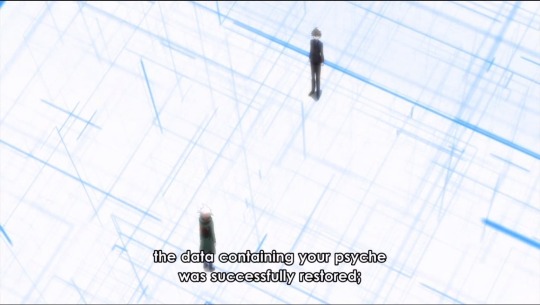
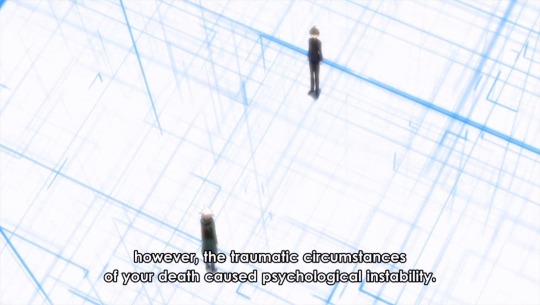
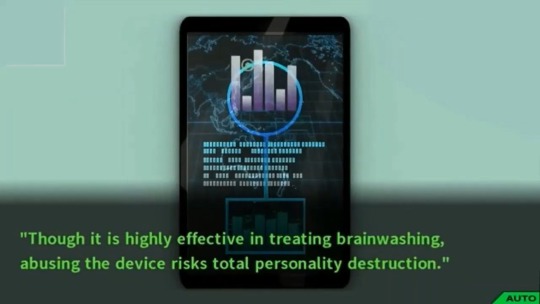
2.5 reverses Nagito's luck cycle which makes it easier to understand and I really love it. It also adds the statement that truly Nagito would rather have his luck not harm others but rather help them and harm himself, there's also the detail that Nagito's luck is so prominent in his life that even in a world made by his subconscious it is always there. It also implies he deep down wishes talent didn't exist which is something he'd never admit or even know he felt with his unhealthy obsession and dedication with hope and the ultimates!!!
I really enjoy world destroyer too, I think his scenes are very interesting, like, ok man thanks for pulling up with your FINGER GUNS??? It's super cool!! His design is pretty interesting too even if it's just adding to Hajime's preexisting one.
I also like the detail that alongside Nagito's own death the memories that he remembers most vividly is Hajime's smile and his time with him which is just very sweet
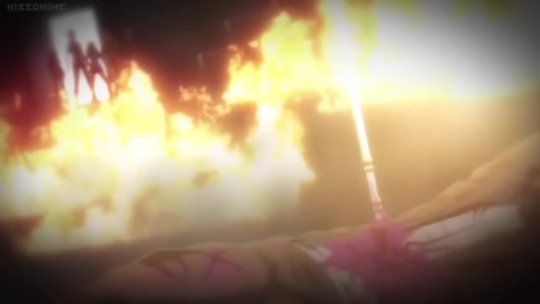
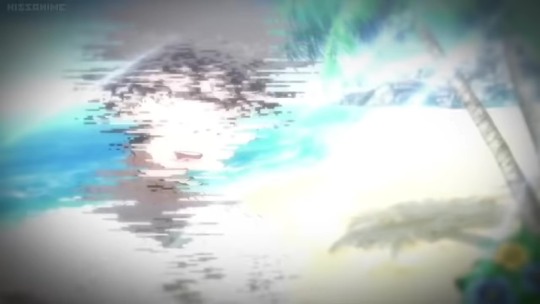
The moments with Makoto and Sayaka being out of character because Nagito views them, especially Makoto, so highly is super funny too. Kazuichi and Fuyuhiko's friendship is also fun and something we don't get to see often! The background characters we get to see are also just very fun.
I find it really interesting that by swapping Nagito's belief with the opposite it's basically telling what the genuine issue is in their world because his beliefs stems from the flawed ideals of hope's peak. The issue in their world isn't the talentless, it's the talented. No one is happy, talentless people feel worthless, and being talented is exhausting in its own way. All of the social pressure of not being treated as humans being at its most extreme in this world is upsetting for most everyone.
also this Parallel makes me lose my MIND!!!!!!
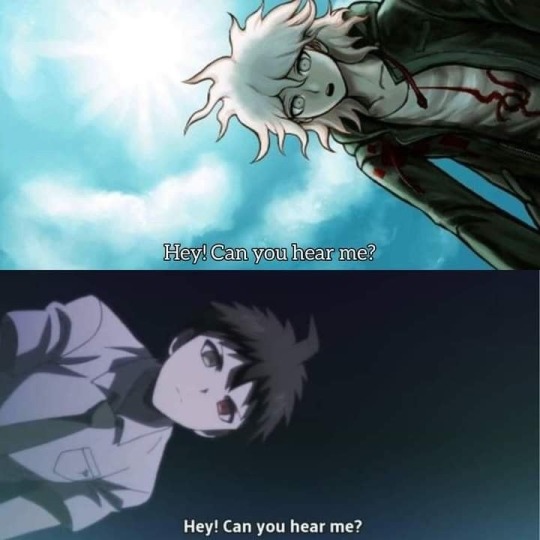
Danganronpa 2.5 has a lot of REALLY good stuff going on for it, I think the only complaint I see about it is Nagito's "contradiction," which I'll talk a little bit about!
Basically, people like to point out that with Nagito's suicide plan he should have been more upset, "He never believed in Hajime though?"
I've seen a few pretty good interpretations of it, but the one I think makes most sense is that he was talking more to Izuru kamakura since he had gotten his memories back. Nagito's old and new memories merge together, he remembers pretty much everything. Which is why he sees Izuru first, then corrects himself seeing Hajime, and Hajime replies that they're both him.
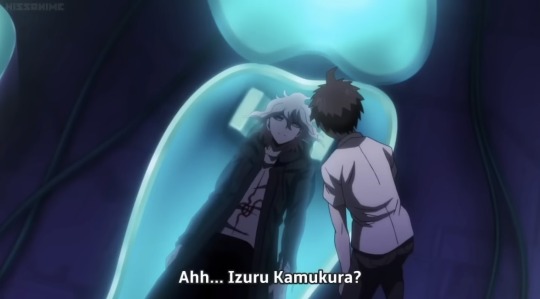
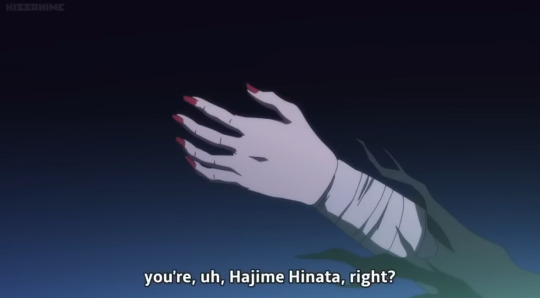
Nagito then says he knew he'd make it to the lowest stratum, and that he believed in him. Basically saying that Izuru could do anything.
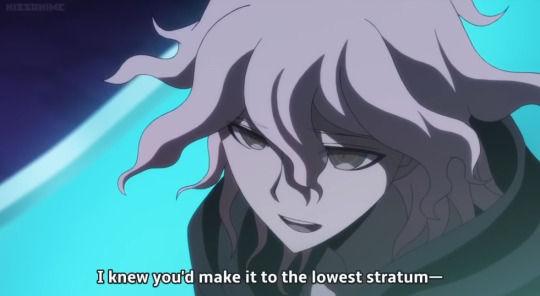
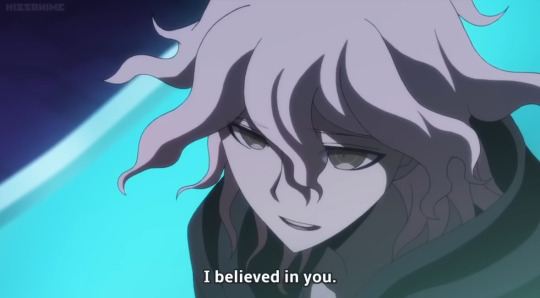
Maybe he believed the supposedly Bad luck from going into the Neo World Program would end up in Good luck? It's unclear a bit, but I definitely believe he's talking to Izuru a bit at the very least. Mostly because if he believed in Hajime in the killing game his luck cycle wouldn't have gone, good luck: the traitor was selected, bad luck: the plan didn't work and they lived.
Nagito has known Hajime and Izuru now and accepts him for who he is. It's honestly really sweet. Hajime himself has grown and accepts Nagito for who he is as well. They both forgive each other and it's just really sweet. They've been through a lot!
Overall little rambles aside, I think Danganronpa 2.5 is really lovely. It adds more to Nagito's character, tells more information about how the class woke up while using actual text from Danganronpa 2, and is just super fun! I love Danganronpa 2.5 a lot.
#nagito komaeda#danganronpa#danganronpa komaeda#danganronpa nagito#sdr2 nagito#sdr2 komaeda#sdr2#komaeda nagito#danganronpa goodbye despair#danganronpa 2.5#dr2.5#komahina#hajime#world destroyer#nagito ova#nagito komaeda ova#super danganronpa 2#super danganronpa 2 ova#danganronpa 3#dr 2.5#nagito mwa#anonymous#anonymous ask#anonymous asks#ramble#danganronpa asks#asks#i dont know what else to tag#NAGITO I LOVE YOU!!!!!!#:P
54 notes
·
View notes
Text
Digimon adventure 02 The Beginning Review: All Filler, No Killer
I wanted to love this movie. I was well aware of people’s complaints going into this, but I still expected the best. I was wrong. I went in expecting a coherent and compelling narrative, instead it was all filler, no killer.
This movie is sadly a waste of the 02 cast. While marketed as their revival film, their presence was little more then window dressing to another chosen child’s story. Not a single 02 cast member made a contribution to the plot that could only be made by them. Not a single 02 cast member received a character arc in the film. The most focus and effort put into showing their lives as adults was the opening montages of the film. While a beautiful opening it was, it was not enough to make this film worth watching for any digimon adventure fans.
Not only did this film not focus on any of the 02 digidestined, it did not address or mention the plot of last adventure kizuna and its major reveal (unless a certain single line of dialogue in the closing narration was meant to imply kizuna’s reveal is now meaningless, despite never even being mentioned in the film prior). Instead we were treated to another story about a new oc crammed into the franchise, cough male Meiko cough. For every complaint people had about Meiko’s focus in tri, this movie did it worse. She had 6 movies, so at least the focus on her was spread out and the 8 characters the audience is invested in had character arcs, that is not the case here. Instead , we were treated to a story about another digidestined. Another claiming to be the first, which we were previously lead to believe we saw in tri, which was a weird retcon to begin with, then we met the first child to lose her partner in kizuna, and now we meet a new special snowflake, with his new special digimon that apparently is responsible for the partnership between all digidestined and digimon, and maybe even the death of his parents (lol). Not only is this insulting to adventure cast, but fans as well. When will they realize, we don’t need shocking reveals that contradict previously established lore, but meaningful character arcs for our chosen children and to see their partner digimon reach new digivolution heights.
The director of this film possibly thought he could recapture the magic of the first 02 film, but what makes that film more enjoyable is the fact that it came out during 02’s original release and not decades later. And while Willis was a primary character, the main cast still had plenty of chances to shine. Like gatomon and palmon suddenly reaching mega with no build up whatsoever lol.
This film contributed nothing new for our 02 cast. No new mega forms, or even their ultimates, new new levels for DNA digivolved Silphymon and Shakkoumon, not even the chance to see the digiegg of kindness in the anime for the first time. Hell, armor digivolution never even got mentioned, but at least we revisited the computer lab.
Not to mention that after all these years, there are still plotlines left unresolved. The dark ocean still hasn’t been explained, despite being brought up in tri and claiming Maki Himekawa, nor has its ruler Dragomon, or what happened to Daemon once he was stranded there and the fact his presence alluded to a plotline with the 7 demon lords. These dangling plotlines would have been perfect to address in a 02 movie or series, instead we got something less meaningful then a shounen filler movie (like the original 02 movie). At least those typically allow for their cast to shine despite focusing on original characters.
The 02 cast deserve their tri movie series, or even their version of kizuna. They needed to regain the future they achieved at the end of 02 that got retconned away, despite the epilogue still apparently being canon. They deserved character arcs, and some damn confirmation on takari after all these years. I wanted to see them overcome obstacles, to achieve their dreams. Instead I endured a meandering story for a new more chosen then all the rest of the “chosen children”. Can the people behind the digimon movies please stop trying to one up each other now?
I encourage all digimon fans to still watch the movie. If we want to see the adventure and 02 cast again, we need to support the series, but we also have to let our complaints be known, in order to encourage a better outcome in the future. While this film is a waste of the 02 cast, it is still nice to see them again, even if their presence felt more significant in their brief subplot in kizuna. At least we have confirmation that they’re still making progress towards their dreams, still hanging out and still hoping for a brighter future with their digimon. What little we got of them interacting was still nice, funny and even heartwarming at times. And if you’re a dub fan, at least we got Brian Donovan back as Davis one more time. Weird they let him reclaim the role but not Lara Jill miller for Kari, even though Tara Sands is still great.
Until next time digimon fam, stay Prodigious
(If you like my review and have my anime list, please follow the link and like it there. Id like to gain alittle traction as a reviewer and its always nics to be able to see if my writing is appreciated)
P.S. And To Lui, the saddest chosen child in all the land
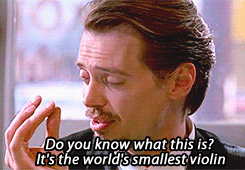
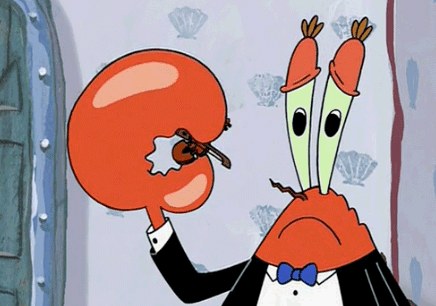
#digimon#digimon adventure#digimon adventure 02#Digimon Adventure 02: The Beginning#takeru takaishi#tk takaishi#kari kamiya#hikari yagami#davis motomiya#cody hida#ken ichijouji#yolei inoue#hawkmon#gatomon#veemon#patamon#wormmon#armadillomon#review#anime#digital monsters
21 notes
·
View notes
Text
Ok dumping my thoughts right here now that I’ve collected them since reading Batman 138. It’s a doozy, so bear with me.
Honestly, the premise of Gotham War is intriguing and could’ve been good if not for the sloppy execution. It’s interesting to see Bruce’s psyche rapidly declining, but how Zdarsky is going about it is ham-fisted and forced. First off, Selina’s method is outlandish and riddled with plot holes. There’s no skirting around that. Now logically I could see the batfamily members not declaring an allegiance to either side because both Bruce and Selina are in the wrong here; Bruce is losing his mind because Zur is hijacking it while Selina thinks training criminals will magically solve all violent crime in Gotham and everything will be sunshine and rainbows. But having the kids blindly fall into line with Selina because they agree with her plan is dogwater writing that I’m surprised Zdarsky cooked up after his spectacular Daredevil run. Have them form their own faction and let them actually act like they have agency and purpose instead of shoving them into roles that don’t fit.
Now I’m a little skeptical on the whole Jason/failsafe stuff. On one end, it’s a daring concept to play with. It shows how Bruce is going off the deep end and raises the stakes of the plot. On the other end, it’s going to drive an enormous wedge between Jason and Bruce for the foreseeable future. Like, there is no forgiving Bruce for this easily. Maybe that’s a good thing though, considering Jason for the past few years has been cycling through the same character arc over and over again like a washing machine that spits out clothes that are more worn-out after every load. Taking him out of the batfamily fold and inserting him into his own corner of DC sequestered away from Batman might actually force DC to write him organically, depending on whether or not Jason doesn’t go insane himself because what Bruce did to him was quite literally torture that will now be perpetual. Wowza.
My next gripe is the timing between comics. Batman and Robin’s timeframe is vague, but after reading 138 it makes zero sense why Damian would steadfastly stick by Bruce’s side—unless of course B&R happens way later, and somehow Bruce regains minor control of his mental state. Or the most realistic explanation being that the writers didn’t communicate the timelines, leaving their stories to contradict each other. But what are comics if not zany contradictions of stories? So I guess this gripe can slide…for now. Benefit of the doubt to Williamson at least because he planned B&R way in advance, meanwhile Gotham War was strung together as a myopic copy of Marvel’s Civil War in order to—I’m spitballing here—have Bruce be alone for a while in his own comics because he’s “a loner”…despite his character being, at his core, a family man, and whose character revolved around family for decades. Family rift stories can be good. Packed with drama. Exciting. This is none of the above.
Finally, arguably my biggest complaint about this dumpster fire, is Tim. Writers tend to be biased toward characters, I understand that, but when favoritism bleeds into the writing it sours the story altogether. Having Tim assume this role of “Bruce’s savior” is incredibly cheap and a little laughable at times. I see that they’re trying to establish him as important again, reliving his glory days as the Robin who helped guide Bruce back onto the right path after Jason’s death, but throwing other characters under the bus to lift him up is crazy. Especially Damian, because Damian saved his dad’s life twice in the last few months. Seriously, I’d brush it off if Tim hadn’t told Damian he was the one who helped Bruce out of the darkness while Damian only pushed Bruce further into it. Paraphrasing, but that’s the general idea: Tim is a saint and the rest of his siblings (Cassandra? Who?) are a cut below him when it comes to helping dear old dad out of his bad place. That hug was cute, but it was sugar spread on a pile of shit.
#rant#batman 138#batman#batman comics#i have a lot on my mind at 1am and i need to wake up early for classes oops#spoilers for batman 138 / Gotham war
16 notes
·
View notes
Text
Balto 2 Wolf Quest main problem
Balto-2 was… a very controversial topic among fans, especially fans of the original Balto 1995 film. The only defense for the sequel that I can say — the crew of Balto-2 (especially the writer and the director) were really nice people, as well as the sources of inspiration for Wolf Quest were really deep, mature and interesting and gave very promising themes about coming of age, parent-child relationships, finding own place in the world, self-discovering, learning the culture of far relatives and ties with nature. And they had several fresh and cool ideas for another sequel.
However, the story has issues, which, unfortunately, ruin really a good story. From the story perspective there are two aspects, which totally contradict to the original film and hence devalue it.
First of all. In the original Balto the main protagonist becomes the hero, who saved sick kids of Nome, so both humans and dogs finally accept him and see his kindness and nobility. In Balto-2 Aleu is the only pup, who resembles Balto the most, hence every family would adopt her first, a daughter of the wolf hero. But for some reason nobody wants to adopt her due to wolf traits despite there's no reasons for distrust toward wolfdogs anymore.
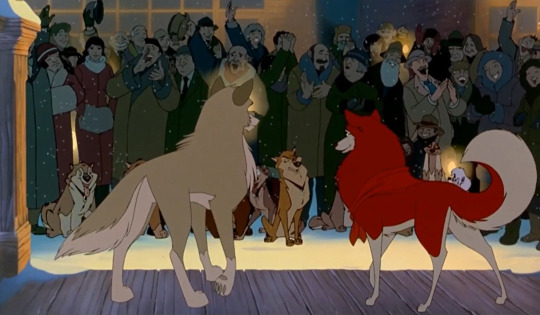
Second. In the original film Balto finds out who he truly is (a wolf) and embraces his wolf nature, overcoming his inner demons and self-doubts in the gorgeous white wolf scene. Simply saying, Balto accepts his wolf heritage and becomes confident, he realizes that it is a strength, not a weakness or disgrace, and exactly this saved his life and lifes of those kids, hence he would teach his pups to be noble and confident, be proud of the wolf ancestory.

However, for some reason Balto-2 ignores this crucial moment and makes Balto to be ashamed of his wolf side again and to hide from his daughter the fact of his wild roots, insisting the idea that she will be a good dog and her heritage is great due to her mother being a purebred dog. Yep, the same character, who said "Since when you need a pedigree to help someone?" in the original movie, in the sequel points out purebred dogs as superior...
The main complaint from fans of the original film was the decision of the sequel to turn the White Wolf into Balto's mother, Aniu, ruining mystery of the scene and this character. Fans tried to find explanation to this in the original film, but the answer is simple — the crew of the sequel simply enjoyed the white wolf from the original film, they had no information about the intention of the original film. Yes, they said that Aniu was the white wolf from the original film, but it is not true. If you read interview with the director of the original film, read the script and see all production materials (concept arts and storyboards), you'll find out that the white wolf was a male and symbolised Balto's wolf side and self-acceptance, as well as Balto's wolf side came from his father.

What I can say, the main problem and mistake of Balto-2 is exactly the decision to make Balto's mother to be his wolf side, because other morbid moments exist only because of this decision, erasing the original movie and creating plot holes, logical holes and contradictions. But about everything in order.
In the sequel Balto mentions that he lived only with his wolf mother and knew only her, i.e. there's no pack or whatever. And he had fond memories about her, her white fur and warm voice. Being very young pup, he accidentally got lost, Boris the goose found and took him in, raising him as his own son. Balto never had a father — according to the sequel's crew, Balto's father was never developed, but was intended to be an unknown stray dog, a loner, who begets a pup and then never even knows it. I.e. there was no love between him and Aniu, he abandoned her after mating. Yes, you get it right. If in the original film dogs were afraid of wolves, here we see some crazy dog, who runs hundreds miles away from a village or town to the forest, full of hungry wild animals, mates with legendary and revered she-wolf, leaves her without any consequences and then has no idea about Balto's existence.
So, here's my questions. Why the she-wolf mated with this random stray mutt? Why she raised Balto alone, not in a pack? Why did Balto think that his father is a dog, if Balto never had a father and vaguely remembered only his mother? Why Balto considered himself as a half-breed instead of a wolf, if he was only with his wolf mother? Why humans from Nome considered Balto as a wolfdog instead of a regular wolf, if Boris the goose found and raised Balto, not humans? Why he didn't leave Nome and didn't try to find his wolf mother all this time? Why his mother didn't use her nose for finding her son's scent and returning her son?! Balto used his nose to find the lost sled dog team, travelling many miles, and succeeded in this! Why Boris brought young Balto in Nome (and travelled thousands of miles from the forest somehow) instead of help to find his mother? Since Balto knew only his wolf mother and loved her, why on Earth he would be ashamed of his wolf heritage? Why on Earth he would have this inner conflict with "Who am I? Wolf or dog?"? Balto would perfectly know that he is a wolf and would be proud of this, he'd go with a pack! Why on Earth he would desperately want to be a sled dog and to be accepted by humans and dogs, if his mother figure was a wolf and his father figure was a wild goose, who disliked humans, and especially if all townfolks and all dogs of Nome rejected Balto all his life, while wolves were friendly to him and wanted him to become a part of their family? (not to mention stupid fan-theory "Hunters killed Balto's mom" from nowhere — then Balto would hate humans and dogs even more) The idea of Balto's mother being a wolf makes zero sense and impossible. It ruins everything.

I especially "like", how she reveals herself to Balto and then disappears, showing no love to her son and no answers to audience.
Not to mention Balto's clear attempt to blame her in his and Aleu's troubles, since he refers to her as "the wolf" and "she" and is ashamed of her despite the fact that Balto knew only her and lived with only her and loved her (and at the same time he wanted to be a dog and refered as "dad" to unknown dog, who abandoned his mother and has no idea about Balto).
2. If you didn't know, Aniu is the wolf deity, the author described her as The Great Mother of all wolves and a part of The Great Guardian Spirit, she symbolizes the call of the wild and helps to find true self. Plus, the sequel itself hints this — wolves always refer to her as the Great Aniu, she transforms into various other totem spirits, and she is depicted on the totem pole, hinting how ancient she is. This fact makes Balto literally a demigod-wolf, half-spirit basically.
And there's a serious problem, because making this wolf goddess as Balto's mother creates a lot more questions, holes and morbid moments.

Why this wolf goddess mated with a random stray mongrel? When young Balto accidentally got lost, why Aniu didn't try to find and return him? If she couldn't be with him due to her divine nature and duties, why she didn't bring him to a wolf family? She is the revered goddess, every wolf would be proud to adopt and raise her son! But nobody among wolves knew that their goddess had a demi-god son all this time! She literally abandoned Balto to suffer among humans and dogs and to deny his wolf nature and she ignored him all his life.
Plus, according to the crew, the totem spirits attacked Balto, 'cause he denied his wolf part, while Aleu didn't. Ah... then they should attack him since puppyhood. The same thing with the nightmares Balto had — the reason is that 'cause he denied his wolf side, but he had nothing of this in the original film. And exactly Aniu made these nightmares and visions.

Moreover, this idea literally destroys the original film. The original film was about self-acceptance and inner nobility, how Balto, being nobody with regular parents, becomes hero due to own moral qualities and noble deeds in contrast to the purebred and evil malamute Steele — the choice and deeds matter, not origin. Balto-2 Wolf Quest instead makes the opposite idea that Balto is a noble hero, because he has divine heritage, because his mother is a goddess, and that his daughter became the leader of the wolf pack because she is a granddaughter of this wolf goddess.
Plus, as I pointed out here, the totem pole always was here, so Aniu and other spirits saw Balto's pain and suffering, but did nothing to help him, Aniu didn't help to Balto to embrace his wolf heritage, when he was a pup or a teen, so he could go with a pack. She did nothing, when Steele tried to murder Balto several times. Why?

Well, according to the author, because Balto was "only a part of greater plan", and the result of the Aniu's prophecy is Aleu, Balto's daughter, who inherited magical abilities from Aniu and was the chosen one. And Wolf Quest several times hints that Aniu has foreseen everything.

It means that Balto was unloved, unwanted and unneeded pup for Aniu. She mated with a random mutt only for this "greater plan" and "prophecy". She birthed Balto and then abandoned him only for this "greater plan". She ignored him all his life and ignored his pain only for the prophecy. She doomed her son to suffer among humans and dogs only for this and only for birth of Aleu as the chosen one. By this same logic, she, the one who protects wolves, decides to help humans (i.e. enemies of every wolf) by throwing Balto as the one who will save them and mate with another dog. Simply saying, Balto was born as a wolf demi-god and abandoned in suffer and pain simply to birth the female demi-god wolfdog, who is the chosen one. Because some totem deities decided so, and one of these deities was his own mother. And everything in the original movie and the sequel was predetermined then. Great, no comments...
#balto#balto movie#balto 1995#balto 2 wolf quest#balto's mother#balto's father#aniu balto#white wolf balto#balto the white wolf#aleu#aleu balto#balto aleu
7 notes
·
View notes
Text
With the first ark of the idw comic I wanna take a breather and go over it all. Give some more in depth thoughts, I will start to do the same at the end of issues for IDW as well as archie when it gets more actually serious, as well as talk about arks when they end.
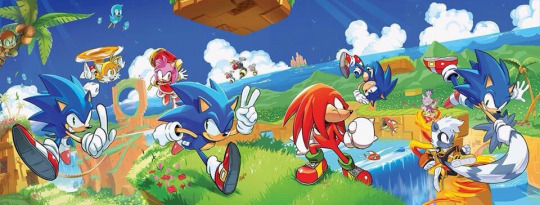
The idw sonic comic starts on such a high note, This first ark feels exactly how a sonic story should, great characterization of the main crew, fun action set pieces and quick pacing. It doesn't get too bogged down or doesn't stay for too long. Right off the bat it nails the characterization of sonic and most of his crew which, to me at least, is the most important thing about this comic. I could watch sonic and friends to anything from the extreme to the mundane as long as they are written well. It was also very exciting to see neo metal sonic and metal overlord again. I loved the mr. tinker plot even if I wish we got to spend more time on it and all the original characters introduced slapped.
Rough and Tumble are you usual mooks, the duo that can take a punch but ultimately will get beaten in the end without too much issue. However they are such cool designs (especially a fan of rough's) and are played goofy enough that it's just fun when they show up. They also got that team rock intro and people make fun of them for it. It's a bit I will always love every time.
Tangle is great, it's nice to have a solely action oriented female character who can party alongside sonic. Sure amy is there but amy has more responsibility as well as has a lot of baggage through her history in the franchise, plus you have to worry about romance shenanigans which is kinda exhausting with those two (I have been jerked around with this ship for so fucking long with the will they won't they, just say they if they will or won't already). Tangle is just here to fucking party and I'm super here for it.
Whisper needs a hug, While we are missing most the pieces currently (I'll get into more with the tangle and whisper mini series), she is already a super fun character. She's super cool and I love her design a lot, I can't say much though without talking about the mini series
and Starline my favorite, It's just fun to see a character who's diehard loyal to eggman but not blindly so. While we haven't seen much yet so I won't get too into it, I love how even when starline goes under eggman's nose it's not to double cross or backstab but to hopefully bring him along with him. Sure in litteral outcome this does end up similarly to backstabbing but the context makes it so much more interesting then just "I'm going to stab the main villain in the back."
However it's not all sunshine and rainbows I do have some complaints, Namely with you guessed it Shadow, and trust me I'll have more to complain about as this goes on but for where we currently are I'll say this, he's not totally terrible, his first appearance is actually pretty enjoyable, sonic and his moral conflict feels very in character even if shadows stubbornness to the extreme it's shown feels ooc. However his lack of willingness to actually work with anyone and listen to plans is just so frustrating and contradicts how he acts in other games, like heroes and 06 (I know 06 isn't canon but god damn shadow's characterization is on point and I think looking at it for reference is fine). Now I know that this isn't entirely the writers fault, this is obvious when you look at Even Stanley and compare her writing of shadow in her personal sonic fan comic to the idw comic and it becomes obvious. I've also heard good things about shadows writing on Ians Archie run so it stands for him as well. A lot of the problems can be laid at segas feet as they want him to be this standoffish lone wolf kinda edgy rivil to sonic who cares for nothing but a good fight and that's just not really shadow. It ignores that shadow has made connections with team dark and has this strong mutual respect with sonic. It just makes me dread seeing my favorite character instead of excited. I will say while mandates are the major point of blame here I will say some of this can be layed at the Ian Flynns feet as he's not perfect. This becomes clear as Evan Stanley's writing of shadow is much much better (even if still restrained in this confine of the mandates) Shadow in the Chao race ark is much better than the battle for angle island ark and def metal virus. I'm getting ahead of myself but what I will say is this is my biggest complaint so far with the writing. So far Ian Flynn has done a great job aside from this and it doesn't prevent me from enjoying the comic
also so far all the artist do an amazing job the art in this comic is exilant!
8 notes
·
View notes
Text

I posted 2,396 times in 2022
78 posts created (3%)
2,318 posts reblogged (97%)
Blogs I reblogged the most:
@f4c3
@theminecraftbox
@call-me-apple
@ranboocio
@dreamsclock
I tagged 321 of my posts in 2022
#dsmp spoilers - 170 posts
#dream smp - 34 posts
#dsmp - 33 posts
#dreblr - 24 posts
#ask tag - 24 posts
#my writing - 11 posts
#c!dream - 6 posts
#ask game - 5 posts
#liveblogging - 4 posts
#twisted nightmare au - 4 posts
Longest Tag: 126 characters
#‘this plot twist was theorised and predicted by a lot of people but it contradicts something i liked so therefore bad writing’
My Top Posts in 2022:
#5
C!Ranboo mistaking Mexican Dream for c!Dream and thinking he’s going to be revived… endersmile…
112 notes - Posted September 11, 2022
#4
c!Tommy, Exile, and Loneliness: an Analysis
By someone who watched every stream live and is not a fan of the fanon interpretation — redtaxproject analysis
Exile, for all its importance to the story of the Dream SMP, is often misunderstood and misrepresented by the fandom — exaggerated into a far darker storyline than you would expect from an arc that included the main villain stripping on a log for Twitch subscriptions. Much of this ultimately comes down to the focus on c!Dream as the villain, seeing him as the cause of all c!Tommy’s suffering — meanwhile ignoring both c!Tommy’s arc up until that point, and the various contributions of other characters that make the arc what it was.
To understand how exile affected c!Tommy’s, we first need to understand how the events leading up to exile affected him — he did not go into exile as a blank slate. Beginning with the events of November 16th 2020, there’s the perceived betrayal of both c!Technoblade (turning on the Pogtopians after realising he’d been lied to) and c!Wilbur (setting off the explosives after saying he wouldn’t). This is followed only a few weeks later with the situation that led to his exile — a seemingly inconsequential bit of griefing escalated by politics, with people he thought were his friends turning on him (with c!Quackity and c!Fundy specifically showing a willingness to only side with him when he was likely to win and/or it benefited them).
After losing two of his closest friends, c!Tommy then had to face the fact that c!Tubbo, as president of New L’Manburg, now had split responsibilities and had to prioritise the country over his best friend. Both of these factors together influenced c!Tommy’s mental state going into exile, making him feel abandoned by his friends. This was only amplified by the presence of Ghostbur through most of his exile, constantly reminding him of c!Wilbur’s death.
Now that we have established how the events leading up to exile affected c!Tommy, we can discuss the exile itself. While a common complaint about the arc is that, despite claiming to be alone, c!Tommy is visited regularly, this claim misunderstands why c!Tommy felt alone during exile. For the duration of exile, c!Tommy could only be visited by others — he couldn’t choose to visit someone. This is highlighted when he is unable to go to see the community Christmas tree — while someone builds a Christmas tree for him at Logstedshire, it wasn’t the same as going to see one himself. There’s also the fact that c!Tubbo never visited him.
C!Tommy also comes to view others visiting him as a form of pity, which explains one of the more controversial parts of the arc — c!Tommy dropping c!Jack Manifold in lava when he comes to visit him, lashing out and killing him. Both of these factors are shown with his attempt to hold a beach party (inviting others rather than waiting for them to come) and his response to no-one showing up, which is to deny.
All of this, however, is not to discredit c!Dream’s actions during this arc. The main mistake fanon makes when considering c!Dream is in the belief that he is good at manipulating people — in fact he is quite terrible with it, usually failing in most cases when he tries to persuade someone to do something with words (as shown during the El Rapids conflict and the dethronement of c!George). Instead, where c!Dream excels is in the manipulation of events — taking advantage of things that have happened for his own goals (such as using c!Tommy’s griefing against him), and setting up situations by predicting how others will act (such as staging the disc confrontation).
While his overall plan is still unknown, during the exile arc, c!Dream’s main goal appears to be driving c!Tommy and c!Tubbo apart, separating them physically and mentally, in order to create a situation where he would be in possession of both discs. In order to achieve this he spent his time hindering c!Tommy’s progress, highlighting the fact that others had turned on him, and constantly reminding him of the consequences of returning to the main SMP area. Even when c!Tommy left Logstedshire and hid from c!Dream, his goal was still achieved as c!Tommy teamed up with c!Technoblade — which may have been part of his plan all along.
Finally, we can discuss the events leading up to c!Tommy escaping exile. As a result of everything discussed above, c!Tommy begins to spiral, resulting in suicidal thoughts and apathy towards harm (such as letting mobs attack him). After c!Dream discovers his hidden stash of items, and destroys the progress he’s made, c!Tommy appears to be contemplating suicide — until he realises that the limitations of his exile are, effectively, all in his mind, created by fear. He could always leave at any time.
So he does.
118 notes - Posted August 27, 2022
#3
idk why people write c!dteam with c!dream being the manipulative one, if that’s anyone it’s clearly c!sapnap. we have at least 2 situations where he’s deliberately lied to c!george in a way that drives him away from c!dream
132 notes - Posted February 26, 2022
#2
ngl one of the best things about this ending is how it’ll probably drive a bunch of the toxic c!inniters out of the fandom because they hate it so much
152 notes - Posted November 13, 2022
My #1 post of 2022

4,392 notes - Posted November 13, 2022
Get your Tumblr 2022 Year in Review →
4 notes
·
View notes
Text

Dust Watched: Jujutsu Kaisen 0
Genres: Shounen, Action // 1h45m movie // Orig (x)
Don’t kill me please but wow, that was underwhelming.
✧ story ✧
This is probably the first Shounen movie I’ve ever seen that was more underwhelming than its series counterpart. I usually don’t expect much on the story front from Shounens but plot of this movie was kinda all over the place.
I’m simply not sure who the target audience was here. The first hour of this movie is more or less the exact same as Jujutsu Kaisen’s just swap the characters out. Yuuta is our MC who has no idea what’s going on and gets sent on missions with Maki-Toge-Panda gang. Everything we see in this half of the movie is something you already *know* if you watched the first season though. Maki’s lack of cursed energy, how Toge’s cursed words work, seeing Panda fight in a later scene. The second half of the movie was much more interesting with Getou showing up and wreacking havoc.
However, there is a LOT that comes out of nowhere or never gets resolution. One of them of which is the after-credits scene where we see Yuuta hanging out with Miguel and then Gojou shows up. The only problem is, that the last time we saw Miguel he was working for Getou. If I wasn’t already reading the wiki page during the credits where I was informed that Gojou basically bullied Miguel into joining their side and then sent Yuuta with him back to Africa to study, I would’ve thought Yuuta was the one who ended up joining Getou’s side and they were found by Gojou?? Kinda an important thing to leave out.
Last tiny complaint is just the usual, pretty cringe Shounen tropes. Most of the humour was 50/50.
✧ characters ✧
Yuuta’s character development is also more told than shown... when it’s told anyway. He uses a skill in the final battle that I have no idea how he got. Anyway, I did come to like him near the end but the movie tries to pretend we’re already attached to him in the first 30 minutes which I wasn’t.
For someone who hasn’t read the manga and came here after the show, this felt like a backstory for Getou rather than Yuuta. Yuuta is fucking around in Africa during the events of the first season while Getou is a villain shrouded in mystery and intrigue, so Getou’s shenanigans obviously interested me more because I know he’s central to the story. Unfortunately, because so much of the movie is taken up by redundant content, his story doesn’t have enough time to be fleshed out either. Specifically I’m talking about his lackies who show up once than disappear. We didn’t even get to see their powers properly! The movie also just drops a bombshell that Jujutsu users in the “boonies” are treated differently (abused? ostracized?) but doesn’t elaborate further.
Lots of seemingly contradicting stuff is also going on; Getou not going all out on the kids because he “wouldn’t harm young Jujutsu users” but is basically massacring everyone else by sending out his curses despite Jujutsu users already being few and far between. Gojou basically knowing what Getou’s real plan is and would’ve definitely been able to one-shot Miguel to go help the kids but fucks around instead. His motives being nonsensical without needing ANOTHER prequel to know the relationship between Getou and Gojou.
✧ art ✧
Absolutely floored that this movie has less impressive fight scenes than the show, never seen that before. They’re leagues above most stuff you’d find, don’t get me wrong, but compared to the quality the show set it falls behind. A lot less movement, too many jump cuts, half of the attacks are literally just flashing lights. Everything is also very washed out and lacks that pop of colour that made the original show’s fight scenes so mesmerizing.
The background shots/enviromental detail though is just *chef kiss* fucking beautiful. Every one of them are wallpaper quality.
✧ sound ✧
Music was great of course. I don’t know if I agree with the choice of the VA for Yuuta though. Ogata Megumi is a legend (Kurama my love) but her voice just wasn’t as... naive? Childlike? As I would’ve expected Yuuta to have. Just a tiny nitpick though, doesn’t ruin the movie.
✧ overview ✧
So who was this movie for exactly? Manga readers I guess. They are the only ones who would know all the left out details from the movie and just enjoy the manga in animated form. For people who watched the first season, the first half of the movie is repeat information. It was a lot more of a “turn your brain off” movie than I expected.
My Rating: 6/10
#dusty reviews#Jujutsu Kaisen#ffs i wanted to love this movie tho#the orig show set the bar so high! truly suffering from success
0 notes
Text
OMORI has poor writing (Part 1)
OMORI stans, just block the #omori hate tag now because I’m going to use it to vent my frustrations with this game. If you love this game, I am not going to try to convince you otherwise. I am glad you enjoyed it so much. I am glad it means a lot to you. I’m not here to take that away from you. I honestly wish I felt the same way!
However, if you are like me and finished the game feeling disappointed, underwhelmed, and maybe a little frustrated, then I am here to say you are not alone. OMORI--while having the right set pieces for an interesting game--is a narrative mess.
I’m splitting this into two posts. This first post is about problems with the plot. The second is about problems with the message/moral.
(Note: I use “OMORI” in all-caps for the game title, and “Omori” in title case for the character name.)
Spoilers and criticism below.
Part 1: Plot Writing Lies
There’s a book by Brian McDonald called Invisible Ink which is about how to write a compelling story (you can read this great book online for free here). There’s an explanation of the writing “lie” that I find myself frequently thinking of. A “lie” in this context does not mean something is literally untrue, it means something FEELS untrue, unrealistic, improbable, or unlikely. For example, if a character gets shot in the leg but manages to do parkour, this is a “lie” since it seems unrealistic for that to happen. If a character witnesses their beloved parent’s death and shrugs it off, it’s a “lie” because that reaction seems highly unlikely.
In OMORI, the plot is held together by multiple little lies that--try as I might--I just couldn’t bring myself to believe.
1. Sunny’s friends care about him, and vice versa
A major theme of the game is how friendship can overcome any obstacle. Friendship gets Sunny over his fear of heights, spiders, and water. Friendship is what Sunny remembers before the final boss fight, and allows him to face his guilt and defeat it (and prevent him from committing suicide). With the photobook and dialogue you are reminded over and over and over and over and over again that Sunny’s friends love him unconditionally.
However, I just couldn’t bring myself to believe it. The childhood memories are cute but shallow, boiling down to simply hanging out and eating treats. Plus, Kel and Aubrey fight constantly, with Aubrey even physically hitting Kel when he steps out of line. Hero and Mari behave more like babysitters than true friends to the younger kids.
But at least the other kids interact with each other. Sunny, on the other hand, showed nearly no affection or consideration towards his friends. He floats through the memories like a ghost--he could have been completely absent from all the photos and it would have made little difference. I was ready to accept this as Sunny being an unreliable narrator and not thinking he was a good enough for his friends, but this never contradicted. Instead we are given even more memories where Sunny just silently exists there being “cute.”

[Sunny enriching the lives of his friends by LARPING as a cat.]
Because of the lack of meaningful interactions between them, there was nothing in the game that made me think that these 12-15 year olds would have a strong enough bond that would survive 3-4 years of no contact after finding their friend hanged. In fact, that discovery only drove them farther apart. The only person who I could believe actually had a close bond was Basil, who almost literally filled that trope of being the friend who would help you bury a body (or in this case, help Sunny cover up the accidental manslaughter).
The writing fix for this would be simple: instead of showing us the same boring birthday and beach scenes over again, give the kids memories of overcoming some age-appropriate adversity together: heartbreak over an unrequited crush, anxiety over homework, sports injury, lost dogs, divorced parents, running away from home, bullying, etc. Set a precedent of the friends supporting each other through good times AND bad times. Without such backstory, Sunny’s friendships allegedly giving him the courage to overcome his guilt feels like a lie.
2. Sunny abandoning Basil in the bathroom scene
One of the most confusing moments in the game was Sunny’s negligence when Basil has his first breakdown in his bathroom. This part of the game is player-controlled, which is a strange writing decision because all you can do is click on Basil and various bathroom amenities over and over which completely saps the urgency out of the scene. When you try to leave, Basil begs Sunny to stay, but (due to a lack of player options) Sunny walks out without a word. With no option to talk to him OR get help for him, it makes Sunny seem exceptionally cruel to Basil. In fact, I was starting to wonder if the game was setting up for some sort of twist that Sunny DIDN’T care about his friends, which would fix some of the confusion in point #1. However, as we know, that is not the case. Therefore, Sunny’s negligence/apathy towards Basil’s pain feels like a lie.
The writing fix would be to make it MORE clear that Sunny is intentionally running away from Basil. Make it a cutscene, or, give a false choice such as “Leave Basil? Yes / Yes”. After Sunny leaves, Kel should make some remark about Sunny looking odd, “You look sort of shaken up, is there something you want to tell me?” then hit it home with Sunny shaking his head. This would make it more clear that Sunny is intentionally hiding Basil’s state, as opposed to just being a bad friend. As it stands, it just felt like a writing mistake.
3. Basil and Sunny working together to stage Mari’s death as a suicide
This is the plot hole that I see the most complaints over, but it’s so big I have to address it. Accidentally pushing Mari down the stairs I understand, but the rest is too absurd. Below are some of the “lies” that the writing tries to get away with:
That Sunny and Basil wouldn’t just claim she slipped and fell.
That either boy would even come up with this sick plan.
That they wouldn’t back out of this idea during the multi-step process (carrying her downstairs, outside, getting the jump rope, tying a noose, putting it around her neck, stringing her up, hiding the evidence... This is a series of multiple decisions, not one quick accident like the initial push.)
That it’s not the image of Mari’s death that traumatized Sunny, but the image of what they chose to do to her body that traumatized them. I understand the image of Mari hanging is more dramatic, but they literally did it themselves so why is that more haunting than Sunny killing her?
That Mari’s true cause of death wouldn’t be immediately obvious to the parents, the police, the friends, EVERYONE.
(I’ve seen fans try to get rid of this plot hole by hypothesizing that the parents knew and covered it up, but the evidence of this is circumstantial at best. The father saying, “You’re not my son,” is unreliable since it happens in Sunny’s headspace. Divorce is common after the death of a child, and, at the very least, Sunny’s mom doesn’t show any evidence of knowing what happened. The way it is written, only Sunny and Basil know the truth.)
The ridiculousness of this twist is so extreme that it completely broke any immersion I had left. Frankly, the reveal that the happy, loveable Mari committed suicide is a far heavier and more realistic twist than a crazy murder-cover-up story is.
Additionally, it seems like Basil was only written into this scene in order to make Sunny the true victim of what happened. After all, Sunny may have pushed her, but it was Basil who came up with the demented cover up. (This is apparent from just the photos but the datamined Truth Album confirms it.) By having Basil come up with the plan, the game splits the guilt between the two of them to make the kids easier to sympathize with. It’s problematic because if Basil was not in the scene, there would be no way to justify what Sunny did to Mari. So why is what they did easier to accept when they worked together?
Fixing the writing lie: Sunny lies and says that Mari slipped. Remove Basil from the scene, and instead have Sunny confide in Basil which forces Basil to become a co-conspirator and burdens him with the terrible truth.
4. Sunny’s friends forgiving him and Basil for what they did to Mari
Last but not least, the story heavily implies that Hero, Kel, and Aubrey will forgive Basil and Sunny for what they did to Mari. I found this to be almost as unbelievable as the staged-suicide stunt.
It feels like a lie since the group’s friendship is never established as anything beyond shallow hang outs from 3+ years ago (see point #1).
It feels like a lie because this is hot off the heels of Aubrey being so distraught over Mari and the following fall out that in the last three days she 1.) attacked Sunny and Kel with a nail bat TWICE, 2.) Stole Basil’s photobook, and 3.) Shoved Basil in the lake. This trauma is still very fresh for her.
It feels like a lie because the complexity of the staged-suicide is so extreme, one would be hard pressed to forgive ANYONE for doing that, be it friend, foe, parent, sibling, lover, etc.
I’ve seen fans argue that the ending is not about forgiveness, it’s about telling the truth, and I want to believe that. Really. If the ending was about Sunny starting his redemption arc by telling the truth no matter what the consequences are, that would be a meaningful lesson. But the writing does not support that. The ending headspace segments are focused on assuring Sunny that his friends will support/forgive him no matter what. To do this, the game shows us the shallow photobook memories (again) to show how much they allegedly care about each other. Then, when fighting Omori, Sunny remembers these quotes from his friends, which directly correlate to their unconditional support:
KEL: Friends... Friends are supposed to be there for each other.
AUBREY: I hope you can find some peace... or you know... some happiness.
HERO: We made the mistake of leaving each other when we needed each other the most. This time... we’ll stay together.
BASIL: Maybe one day... things can go back to the way they were before.
The really direct evidence that this ending is about getting forgiveness is this quote from Basil in Sunny’s headspace:

[BASIL: “AUBREY, KEL and HERO are good friends. You have to trust that they’ll forgive us.”]
This is one of the last scenes before Sunny tells his friends the truth, proving that obtaining forgiveness from his FRIENDS is in fact the leading motivation for Sunny’s actions.
Fixing this writing lie is easy. Instead, adjust the writing to be about telling the truth, not about how much the friends will still love Sunny. Have headspace Basil say, “Even if they don’t forgive us, Aubrey, Kel, and Hero deserve to know the truth. It’s the only way to make things right... or close to it.”
Conclusion
OMORI is undeniably a cute game with a strong visual identity, and has a premise that could make for a very compelling experience. However, the sloppy plot and weak character writing cause the potential of this game to be squandered. There are other issues as well that I chose not to cover for the sake of time, such as the poor pacing of the dragged out dungeons and the bizarre, unrealistic behavior of characters in the “real” world.
However, there are a few more glaring problems with OMORI that I have to address: In part 2 of my critique, I break down what may be the biggest problem with OMORI’s writing: the message.
[ Link to Part 2: OMORI’s Message is Mishandled and Distasteful ]
#omori#omori hate#omori spoilers#review#words#fun fact i named sunny 'moony' so I had to consciously change all the moons to suns in this essay#suicide cw
205 notes
·
View notes
Text
THE SPONGEBOB SQUAREPANTS MOVIE: AN INVERSION ON “COMING OF AGE” FILMS AND A CRITICISM OF ADULTHOOD
Hi hello hey it’s me Jericho Jay “Japes” Marshall out here with a pretentious love letter to the filmmaking on display in nickelodeons The Spongebob Movie. Yes, I know it’s a kids movie. Yes, I know it’s not that deep. But I’m majoring in english, and deeply depressed, so I need to get this OUT and onto a PAGE.
I have watched this film many times over my lifetime, a few when i was just a kid, then in my early teens, even when i turned eighteen, and now, a month before i turn 20. Every time, I grow a new appreciation for the nuances that this movie brings to the table, and on my most recent watch my own deliverance from childhood makes me relate to the core themes the hardest I ever have. The Spongebob Movie isn’t just a movie about childhood, but a movie about adulthood.
Today, I’m going to make clear exactly how The Spongebob Squarepants Movie criticizes our understanding of adulthood and how society treats the neurodivergent, while effectively turning the “Coming of Age” genre on its head, within its 87 minute runtime.
START: CONSISTENT CHARACTERIZATION
One thing a lot of films (ESPECIALLY kids films) fail to nail is consistently showing aspects of a character throughout the runtime, enough that changes to a character feel impactful and justified instead of rushed and stifled. The best examples of movies that fail to do this are often the marvel movies that people tend to not remember- the first two thor movies, the avengers age of ultron, etc. In these movies, characters certainly have traits, but their personalities and motives can be very weak and make dramatic changes feel A LOT less dramatic. This can be seen in age of ultron, when quicksilver gave his own life to save someone else, which felt like nothing because he wasn't well developed. He wasn't particularly endearing, nor did him sacrificing his life contradict a part of his character. It felt very much like the writers trying to say "Look, this character which was once opposing the avengers, is now dying for one. Please cry." No hate to the writers of Age of Ultron, but it proves itself often to be an unmemorable part of the catalogue.
In the Spongebob Movie, the characterization is ON. POINT. After the introduction, with the pirates rushing in to watch spongebob, we get so much information regarding spongebob as a character.
Pictured: Spongebob holding a piece of cheese like an operator
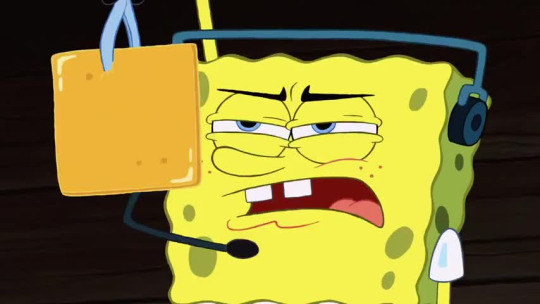
The first scene of the plot is a dream sequence a large crowded scene at the Krusty Krab, with a customer not receiving cheese on his patty, and it being positioned in the same way as a bomb being located. In the dream, everyone is panicked, and Mr. Krabs is visibly distressed, almost like a damsel. Spongebob comes in, announcing his position as manager, much to the relief of Krabs. He goes in, and puts cheese on the burger (again, very akin to a bomb defusal scene), bringing the perturbed customer out safe and sound. Everyone lifts spongebob up as a hero, which is interrupted by his boat alarm.
This scene is JAM PACKED with stuff that both introduces the character to new watchers and introduces the crux of his arc to everyone else. Spongebob of course is very fond of the Krusty Krab, and wants to be the manager- he wants people to see him as cool, and as a responsible adult. He wants to be the sort of person that can be trusted with big responsibilities. And we also see, most importantly, that he is extremely childish through his faximile of what it meant to be adult. Everything is scaled up; it's a very silly situation, which well suits both the joke and his character as an inexperienced kid. This is one of the most direct ways to convey someone's character, because a dream can be interpreted as a direct port into a character's desires. This being the first introduction to the character in the movie sets the tone for EVERY following situation.
In the next few scenes you see Spongebob's real life, which involves his lengthy morning routine; his life is sort of whimsical, and so too is his routine. He showers by shoving a hose into himself till he bursts with water, he uses toothpaste to clean his eyes but not his teeth, and he puts on pants which he must fold to make. Again, all pretty solid jokes, but also very telling about his outlook. He is funny, weird, and childish, which is juxtaposed by the scene where he's- he's uh- showering with squidward. Squidward is an example of the "adult" that spongebob isn't. This has always been the case, but here his normal routine makes it very clear that other people in this world aren't like spongebob. They shower normally, they brush their teeth, they put their clothes on like normal. Spongebob's world is one of wonder and without responsibility, which makes it questionable as to whether he could handle one.
Pictured: Spongebob's room, adorned with childhood imagery
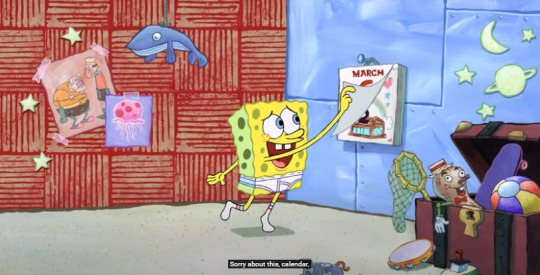
Pictured: Spongebob celebrating his position as a manager, despite Krabs saying that it was squidward who got it
Even his room in this scene screams "kid". He has toys strewn about, glow in the dark stars, and pictures of superheroes on the wall. He even says "Sorry about this calendar" as he rips a page, personifying inanimate objects as a kid would. The movie is telling you, "THIS CHARACTER IS A KID", but in a way that's masked because it's also just a set up for jokes. It's done so well, in my opinion, that it would go over your head because from your perspective you would be laughing along as spongebob did his wacky antics.
On top of that, his excitement for his assured managerial position at the Krusty Krab 2 continues to be bolstered. He marked it off with a cute drawing on his calendar, for those familiar he changes his normal "I'm ready" chant to "I'm ready- promotion-", and he's even already set up a party to celebrate at his favorite chain, Goofy Goobers, a child's entertainment restaurant similar to chucky cheese, albeit replacing pizza for ice cream. He hasn't just gotten excited, but has this childish anticipation for something which isn't even assured.

Spongebob arrives at the opening of the Krusty Krab 2, where he is so excited he can't contain his glee. He breaks the silence and makes members of the crowd uncomfortable, reinforcing again that spongebob is a standout in a world of adults, and a kid who doesn't understand certain social norms, which society looks down upon. When Krabs reveals that Squidward got the managerial position, Spongebob hyped himself so much that he starts celebrating, not even noticing that he wasn't picked. He gets on stage, and begins to give a speech, to which Krabs interrupts.
The next part I think best illustrates Spongebob's clear ignorance to society: Krabs attempts to subtly tell spongebob that he isn't getting the job, but spongebob repeats everything he says into the microphone. Again, fantastic joke, grade A, but the amount this shows how invested spongebob was. He already saw himself as an adult, someone who everyone would look up to as a manager- he could take the responsibility, and isn't aware of everyone likely cringing in the audience. This is the natural step for him in his mind, especially because of his exemplary work which had been previously celebrated through employee of the month awards. This was not an option for him. There wasn't a world in his mind where he would be outclassed by squidward.
Krabs has to break to him that he lacks responsibility, and that his childishness makes it difficult for Krabs to give him such a job. This might seem harsh, but I think the intro again shows how Spongebob saw the job; he didn't understand what it would be like, fantasizing another level in the menial work structure to be an amazing adventure of a job. People in the crowd reaffirm that in the eyes of society, spongebob is just a kid, a goofball. In my eyes, this is a story not just of childhood, but of neurodivergence. Spongebob isn't normal, and is blocked by society for his ignorance of social norms and sunny disposition. He finds things fun that other people can not, and he places values in completely different things. So he is blocked from the meaningful recognition he desired, despite the obvious evidence of his commitment.
I think this is a mighty interesting dichotomy!!! Simultaneously, spongebob's understanding of the world truly is warped, often resulting in a lack of consideration for others as well as harm for himself when things don't go his way, AND he is a good worker which puts in MANY hours of work without so much of a complaint. This is COMPLEX. You have to ask yourself, as a viewer, "would I give spongebob the job?" The answer can be different and can be REASONED.
And that's JUST spongebob! There are other characters with characterization that mixes into the themes of the movie very well, but I'm going to bring up any related points in future sections.
Okay, Okay. So now you're saying "WOW OKAY GREAT so why does any of this matter?" I'm so glad you asked. VERY glad.
2: THE BREAKING OF A YOUNG MAN'S SPIRIT
THIS is the point of the movie. The obstacle in this movie truly isn't adulthood, but instead self doubt. Spongebob's whole world is turned upside down by Krab's rejection of his basic personality. Spongebob asks himself: is it REALLY okay to be who I am? Am I an adult? Is the world fair? One of the most shocking scenes in the movie is blended so well in tone with the rest that you don't really notice; spongebob eating ice cream to cope with his disappointment, akin to that of adults drinking alcohol, and appearing to be visually "drunk" and washed up. This is BRILLIANT, and a recurring theme, where the true line between adult and childhood becomes blurry and impossible to see. Spongebob, the representation of a kid, gets hungover, spiteful, and angry about the injustice of his situation. This is often how adults act in the fact of adversity, but what's funny is that this too is how a kid would act; getting angry and overindulging, feeling entitled and acting socially immature when he didn't get what he wanted. He walks in to the Krusty Krab literally just to shit talk Krabs. And it doesn't stop there.
Pictured: Plankton finding "Plan Z" and looking at it like a centerfold in a playboy magazine
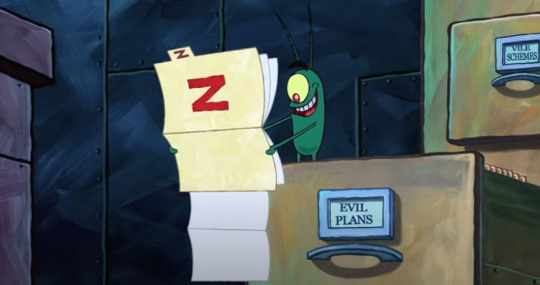
Almost every character in this movie juxtaposes another, again smearing the line of what it means to be an adult. For example, Spongebob and Plankton are polar opposites; plankton is cold and vengeful, angry at the world around him, and spongebob is a happy person who tends not to take things personally, a friend to all. In planktons first appearances in the movie, he is portrayed with clear adult themes, mocking spongebob, making pinup jokes about plan z, and living in a fairly dark and grey space. But, as the story moves along, we see many similarities; both spongebob and plankton are fairly one track minded, and when spongebob's perception is broken he himself gets a little vengeful. When eugene is put in danger over this, though, we do see that he places the lives of others over his own wants. And, even at the end of the movie, we see their similarities. Plankton reuses the "Sorry Calendar" joke that spongebob used at the start of the movie, drawing another line of what it means to be an adult. Is it childish of plankton to say that? Is the inherent irony he has impactful here? His want for something that isn't his, and his disregard for others in pursuing it feels just like how a younger child may steal the toy of another, without understanding what it means to share.
Pictured: Neptune flipping his shit at his lost crown
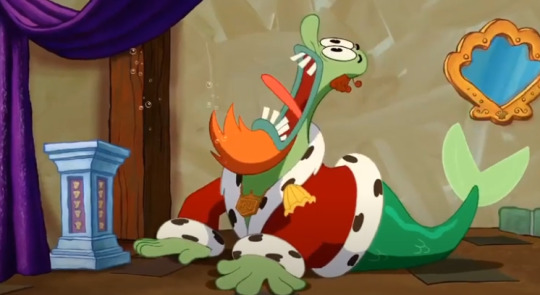
Then, there's the character of Neptune. Neptune is a big man baby. He rules the entire land, commands the most respect, and is considered the most powerful person under the sea, and yet, we see that he gets overprotective of his property, prepared to execute anyone who even annoys him. Throughout the film, he's obsessed with chasing an image of youth, as he is bald, and ignores the suffering of the people on bikini bottom to make sure no one sees his bald head. He throws what's equivalent to a tantrum when he finds his crown is missing, and believes a very crude note written by plankton saying that it was eugene who stole it. His character is an "acceptable" child because he's in a position of power, where spongebob is an "unacceptable" child as he is just a working class member of society. And the funniest part is, that he mocks spongebob for wanting to go for the crown, when even he, the strongest person in bikini bottom, refuses to go out of fear.
We see that these "bastions" of adulthood, plankton and neptune, are the ones who are responsible for missteps of society; we're ALL children in the long run, but the strict enforcement of a perceived true adulthood creates a space where they can act immaturely yet those under them/around them cannot. Dennis makes this case even more, as the only thing he does in this movie is hurt others. There's only one thing that seems to truly denote adulthood, and it's cruelty.
Even squidward, the adult that is supposed to be more responsible that spongebob, refuses to go on the quest to retrieve the crown, as he acts mostly in self interest, even later claiming to only care that plankton was stealing the secret formula as it was hurting his own paycheck.
Spongebob is the only one willing to go, willing to defend the man who wronged him, willing to value life over his own interests. He is both child and adult, just as the adults are too children.
As he moves through the plot of this film, he becomes less confident in his disposition, with his naivete causing moments like him and patrick crossing the state line and immediately getting carjacked, or them being put into an uncomfortable situation by all the bubbles they blew when they tried to get their car back. His bright personality is questioned constantly: Only five days to shell city? BY CAR. This is man's country. But weren't we the double bubble blowing babies?
Pictured: Spongebob caught trying to take back the key to the patty wagon when patrick fails to distract everyone
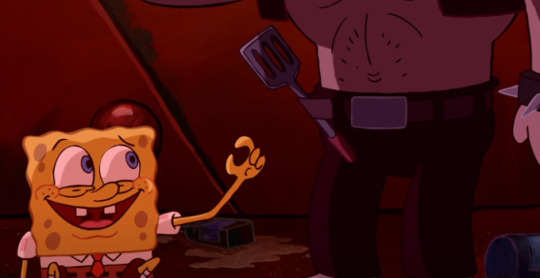
This is made more obvious to him as patrick remains oblivious throughout; patrick is a mirror for him, that acts as a childhood constant, that makes it clearer for him every day the draws of his childishness. There's the moment in the club where patrick's distraction was poorly thought out, and only because he said he wanted to do it adamantly, there's the moment where patrick challenged neptune on how many days they would have to do it, which served no purpose but for his own fun, there's the moment patrick points out the free ice cream trap- he is the unemployed uncritical lens that spongebob is afraid he is.
So everything's fucked, and anyone who is childish is bad i guess!!!
But that isn't so,
3: The illusion of manhood
So we've talked about spongebob's characterization as a naive child, how this is impactful in his transformation into someone who is anxious about that aspect of his personality, and how the society around him is hypocritical in it's own immaturity. But where does this all come together?
Pictured: Planktons dystopian world, which Mindy shows Spongebob and Patrick
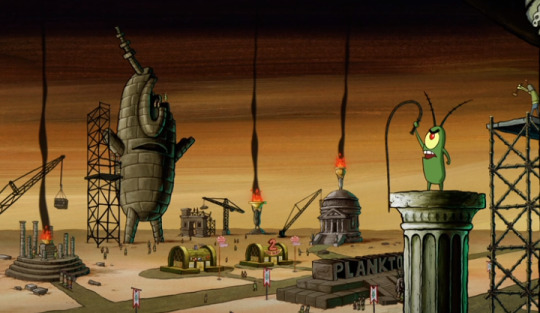
It's at spongebob and patricks "conversion to manhood". At his lowest point, spongebob becomes a squidward- he becomes critical of his AND patricks interests, and regards them as childish, deciding that this means that they can't make it to shell city, as it requires them to be adults. When mindy shows them the dire situation back home, she hopes that spongebob's sunny personality and care for others would shine through, but instead he turns to what society has been telling him; it's impossible. He can't do it, he's just a little kid, and there is no point to any of this as he'll fail regardless.
Thinking about it like this, it truly is one of the darkest points in the entire series; spongebob just openly admitted that there was nothing he could do, that all of his friends were goners because he was effectively useless.
Mindy comes up with an idea; she'll trick spongebob and patrick into believing they're men; she convinces them of mermaid magic (their innocence allowing them to believe) and uses kelp to make them think they've matured into adults. Notice that physical modifiers being the only key to this "fake adulthood". With this, they jump off a cliff because they believe that with adulthood, they are invincible.
This is really telling about how the society they're in thinks of being an adult, and relays that to children. There's another level, a distinct separation between spongebob and adulthood, which seemed like the difference between a squire and a knight- being an adult means that you aren't weak anymore (as though he was weak in the first place), and thus you can do things you never thought before. Is it truly healthy that this is how a society tells kids that adulthood is like, for them to enter the world and feel a truly awful financial and literal hellscape waiting for them? uh, you can, you can decide that for yourself i think.
Nonetheless, they survive the fall, and conclude that they really are invincible, able to power through a ravine with their happy go lucky attitude, eventually befriending the monsters which were once trying to kill them. They weren't acting like adults, but the labels themselves made it possible for them to soldier on with the childlike disposition they had. I find that to be powerful. If we were able to be more hopeful as adults, and power through the worst things brightly, could we do great things? Idk but these depression meds sure do taste good nom nom
After crossing the ravine, spongebob and patrick meet dennis, and have their worldview crushed as it's revealed that they are actually still kids. Dennis being the "alpha male" that he is, is characterized by violence and a lack of morality. The pair are saved by a giant boot, which is the first of two humans in this movie. Spongebob and patrick are both taken by the man in the diver suit, as we fade to black, marking the end of their illusion of adulthood.
4: Back from the Edge (of death)
Spongebob and Patrick awaken in an antique shop, realizing that they were surrounded by fish that had been killed specifically for sale as tacky antiques. They are lifted out of their fishbowl, and put under a heatlamp, as their fate is sealed to become a member among those dead fish. In spongebob's final moments, he mourns his inability to be an adult, as well as to reach shell city; but before they both die, patrick points out that they truly did reach shell city, as the crown was within their reach.
This. This is a phenomenal scene. Why? Because of what it means for spongebob's arc.
Pictured: Spongebob and Patrick on their deathbeds, finding happiness

He sees the crown, and realizes that, unequivocally, that even if he didn't bring the crown back, he made it to shell city. Every person he met told him that he couldn't even do that. and he did it. He is a kid, yes, but he's a kid who went where not even NEPTUNE dared go. Everything people said about him, about how him being a kid stopped him from success, was suddenly shattered. He has been asking himself if it's okay that he is a kid, and he saw, unambiguously, that it is. He is allowed to be happy. He can enjoy things that other people don't. He can be naive. He can be himself, no matter what anyone says. And so can you. Great things can be done by people who are "childish", who are "naive", who are kind without expecting a return, all of it. YOU are okay. Your stims are okay, your comfort series are okay, your interest in tropes are okay, YOU'RE OKAY!!!!
with that, spongebob and patrick are dehydrated on the table, and ostensibly die, the kids that they are, shedding one final tear each, forming a heart beneath them.
...
Miraculously, the tear electrocutes that lamp at it's socket, causing smoke to rise and set off the sprinklers, rehydrating the pair, and bringing them back to life. The "Man in the Suit" attempts to capture them, seeing them about to lift Neptune's crown, but the rest of the dehydrated fish come back to life- squirting him with his own glue and beating him to the ground, as spongebob and patrick run out with the crown. David Hasselhoff offers them a ride back to Bikini Bottom, and the pair begin their ride back.
5: The confrontation of Adulthood and Childhood
Pictured: Dennis looking all lame and shit
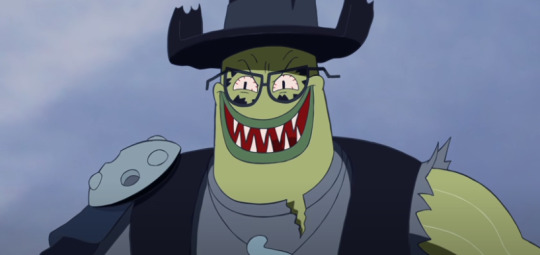
As spongebob and patrick are being swam back to bikini bottom, the boot under which dennis was crushed rockets to Hasselhoff, spitting him back out to finish the job. The appearance of Dennis, IN MY OPINION, makes him look rather goofy, with his broken glasses making him look more like a office worker than a badass assassin as he attempts to kill spongebob and patrick. Spongebob, in trying to reason with him, is able to ruin his eyes with bubbles, and then survives as dennis gets hit by a raised platform which spongebob and patrick are too low to be hit by.
Having defeated one representation of adulthood, spongebob and patrick are shot down by HasselHoffs MASSIVE MAN TITS with the crown in order to prevent Krab's fate, blocking Neptune's lazer just in time as they crash in.
All seems to be well, but plankton uses one of his mind control helmets (which we'll be getting into later) to enslave even Neptune, putting mindy, spongebob, patrick, and Krabs against the wall.
In another stark moment of characterization, Spongebob tells patrick that "Plankton Cheated", which prompts plankton to tell spongebob that the situation wasn't a kiddy game, and that it was the real world. This sort of distinctions in their ethos tell you how spongebob interacts with justice; he believes in "playing fair", while plankton is bitter and believes in getting what he wants.
Finally, the apex to our plot, is a musical number. Spongebob begins to make a long-winded speech, where he takes ownership of every label he was called as he stood on the stage at the beginning, the similarity between the two events being clear (holding a microphone at an inappropriate time, making a speech as he blocks out input from an adult trying to talk him down). Spongebob then busts out into the film's rendition of Twisted Sister's "I Wanna Rock", "I'm a Goofy Goober". This results in spongebob reversing plankton's whole plot with "the power of rock and roll". Plankton is made powerless, and thrown into a little padded cell.
The final scene in the movie has Mr. Krabs freed from his imprisonment in ice, and spongebob is offered squidwards position as manager of the second Krusty Krab. He seems hesitant, and squidward offers an insightful analysis of what spongebob might be feeling (the typical analysis of a coming of age movie, where the protagonist finds out that what they wanted all along is not what they wanted, but it was what was inside all along). Spongebob refutes that squidwards fly was just down, and GLADLY accepts the job.
AND THAT'S THE MOVIE
6: AN INVERSION ON THE COMING OF AGE GENRE
A coming of age story tends to be one which is focus on the growth of a character from childhood to adulthood, asking questions about what it means to be an adult. A character reaches for their perceived adulthood, and realizes what it means to ACTUALLY be an adult, typically juxtaposing what people think (drugs, parties, sex) versus what the movie postures as the correct adulthood (responsibility). In this, I think that the spongebob movie directly criticizes the position of what "an adult" is, in the sense of how someone acts.
Like we discussed in part 2, every adult character in this movie tends to be very childish in themselves, unable to see through simple ruses, and often very possessive of personal property. I don't think we actually see a child in this movie as a speaker at any point, only really as background characters (in goofy goobers to solidify spongebob as childish, and I believe in the chum bucket as they're lead to an unsafe place by their parents, who are supposed to be responsible). Thus, what is mostly examined is how adulthood and childhood is a very thin line. Squidward, for example, going directly to plankton to accuse him of stealing the formula, instead of taking it to the top immediately, which would have ended this whole thing fairly quickly; that was rather silly, and was the fruit of his need to assert himself as an adult.
Spongebob goes through this movie FIRST not caring much about whether or not he was an adult, and it is only after the social pressure from adults does he start to chase it. He then chases his perceived image of an adult, going on an adventure, and is crushed by the fact that he isn't an adult. Instead of finding what an adult is, he instead becomes comfortable with his existence as a child, finding himself at the end of the movie able to comfortably chase after an ideal again, where in a normal movie he would humbly reject the job he was offered.
This is, truly, what we should all take from this film. Spongebob realizes that people who aren't necessarily socially adjusted or acceptable can do great things, regardless of what the people around them say, especially because the people around them are liable to throw tantrums and be actively harmful to society. He is allowed to find comfort in childish things, and to be naive, because the world needs more people willing to help others. It's a scathing criticism on the imposed adulthood that exists in a lot of coming of age films, which begs us to drop fun in the interest of doing the right thing, as though those two ideas are contradictory.
BONUS: EXTRA STUFF THAT I LIKED
The goofy goober song became really good storytelling, at first marking childishness, then marking a level of discomfort and judgement in the club, then marking spongebob recognizing that his happiness came from what he liked and not some vague idea of adulthood, and finally marking his full acceptance of his childishness, taking the form of rock, the music of rebellion. It's not as subtle as leitmotifs, but it works really well in how the same song can give very different feelings throughout, and inform how we interact with a story.
There are a lot more examples of adults being pressured into childishness, with the connected twins who liked goofy goober at the club, who were beaten senseless for absolutely no reason, which highlights the way that the society hurts people that, by all means, are just as much adults as anyone else. There's of course Plankton's helmets which created a society of people who simply slaved away with nothing to say, taking life as it came and listening to authority.
On top of that, this movie is PRETTY ANTICAPITALIST AND ANTIMONARCHY, despite those things being allowed to continue to exist at the end- monarchy is seen misusing power constantly and often for unfounded reasons, and Spongebob's diligence at work is rejected by a penny pinching Krabs, who cares only about money. Like, THE KRUSTY KRABS ARE RIGHT NEXT TO EACH OTHER? THAT IS SOME MONTY PYTHON ASS SHIT. This year is the first year i laughed at that joke, because it's really some "capitalists are fucking dumb as shit" humor that slipped over my head when i was a kid. The villain literally being defeated by Rock and Roll, which was sung with a message against the oppression of differences in people? Yeah, I think the spongebob movie hated rich mother fuckers.
END: UH YEAH THAT'S WHAT IT IS
So yeah. The movie is good I think. There's a lot more i could go into, but I've been writing this post for hours and at this point i haven't even read it so...
I recommend going back and giving this film a rewatch!!! Pay attention to all the moments where adults act like children/kids act like adults, because it'll make ur brain pop like a zit. Anyways that's me, I'm Jericho Jay "Japes" Marshall, and I HATE facism.
27 notes
·
View notes
Text
The Witcher: The Games vs the Books part 2 – Characters and Accents
So, I've already talked at length about the relationship between the Witcher books and games, but how well they captured individual characters is its whole own subject – and you’d better believe I have enough thoughts on it for a whole extra post.
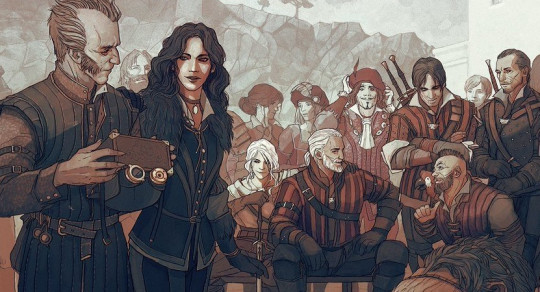
Andrej Sapkowski's skill for creating vivid and engaging characters really is so much of what brings the books to life, and no matter how much work an adaptation might put into worldbuilding and plot, it's the characters you've really got to nail to get the long-time fans on board. Especially when you’ve done what the games have, framing themselves as a direct continuation of Sapkowski's story. Nothing invites comparison to your source material like basically forcing fans to read the original novels to understand even half the backstory alluded to in-game.
So how did they do? I can only offer my opinion – characterisation is necessarily going to be a lot more subjective than just telling you what plot points the games contradicted outright – but like any fan, I have opinions in plenty.
Of the main cast, I feel Yennefer is the character they've captured the best. They've done just as well with some supporting players – I have no real complaints about Dijkstra or Phillipa, for example, who are favourites of mine in both games and books. For the main players though, Geralt and Regis seem to be the ones who's differences I'm most inclined to forgive, whereas I don't feel like they've done Ciri justice at all. Book!Geralt is much less of a smartarse, for one thing, whereas Book!Ciri is much more of one. But if we're talking about the differences, I’m afraid we really need to start with Dandelion.
Dandelion
For all the genuinely good work the games do with characters, old and new, I don't think I can overstate what a disservice the they've done Dandelion, who I could not stand in TW3, but is now one of my favourite book!verse characters. Alas, Dandelion is a prime example of something the Witcher games really don't do well: camp. Being the archtypical bard, Dandelion is about as flamboyant as any enthusiastically-heterosexual man can be: you should be able to spot this guy by body language alone, he should be flouncing around and he should talk like a spoiled noble auditioning for Shakespeare. Book!Dandelion is over-the-top and ridiculous and just so much fun, and I loved him well before I'd even really gotten into the rest of the books around him.
Here's just a bit of dialogue from one of his first appearances, to give you a sense of how he and Geralt play off each other.
The bard seized the fingerboard of his lute and plucked the strings vigorously. ‘How would you prefer it, in verse or in normal speech?’
‘Normal speech.’
‘As you please,’ Dandelion said, not putting his lute down. ‘Listen then, noble gentlemen, to what occurred a week ago near the free town of Barefield. ‘Twas thus, that at the crack of dawn, when the rising sun had barely tinged pink the shrouds of mist hanging pendent above the meadows—’
‘It was supposed to be normal speech,’ Geralt reminded him.
‘Isn’t it? Very well, very well. I understand. Concise, without metaphors. A dragon alighted on the pastures outside Barefield.’
Though TW3's Dandelion certainly looks the part, you have to go hunting through art from the Gwent cards to find much that comes close to really capturing his personality (see left pic below – though even there, a Dandelion who'd voluntarily break his treasured lute is a very hard sell). Though a lot of fanart does better (right-below – credit goes to Tatiana Ortaliz).
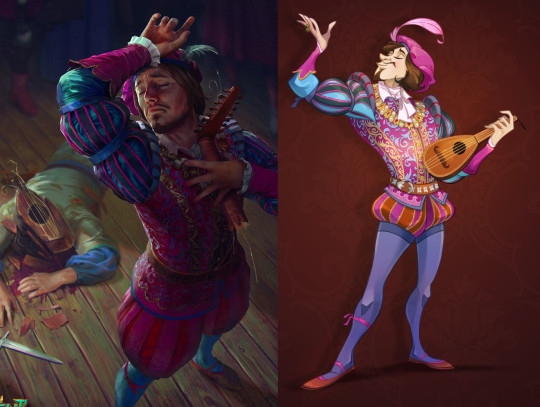
But as poorly as the games capture his flamboyance, they're not that much better when it comes to taking him seriously. TW3 left me thinking he was all talk and no substance; the books make abundantly clear that he really is renowned enough to be welcome in courts across the continent. Though he often overestimates what he can talk himself out of, he isn’t stupid either: he's lectured at Oxenfurt, spied for Dijkstra, and then there are the moments where the frivolous playboy mask slips and you realise he's sometimes much better at understanding people and relationships than Geralt will ever be (which is honestly kind of funny considering how many of Dandelion’s relationships end with plates being thrown at him from an upper story). He's not at all above mocking Geralt when he deserves it either (and especially his personal and relationship issues) – Geralt will happily mock him right back.
We never do learn how they became friends (I'm pretty sure the incident listed in the wiki is just the date of their first expedition together, not their first meeting), but Geralt just doesn't form lasting friendships or romances with anyone he can't have an intelligent conversation with. And Dandelion is a damn good friend to Geralt – one who, despite being a helpless, squishy little bard, will keep Geralt's secrets under torture, or will follow him into Nilfgaard in the middle of a war simply because you don't let a friend make a trip like that alone. (Seriously, I don’t ship it nearly as much as some, but hot damn there is some material in here if you do.) In short, it's basically inconceivable that he'd leave an amnesic Geralt wandering around Vizima alone, as he does in the first Witcher game – which is the kind of thing I can mostly forgive as a gameplay conceit, only it doesn’t really get better from there.
He’s also supposed to be blond, something I don’t think is technically specified until fairly late in the novels, but 100% what I’d been picturing since his first description as a man in a colourful bonnet with cornflower-blue eyes (let’s face it: Dandelion’s hair isn’t the only thing about him that screams ‘blond’). It’s a shame no-one from the games to the show to the novels’ cover artists seem to have noticed – but at least there are some fanartists out there who were paying attention (credit for these goes to Asphaloth, Ghostcupdraws, Hvit-ravn (tumblr deleted), 94355 and itsmespicaa).
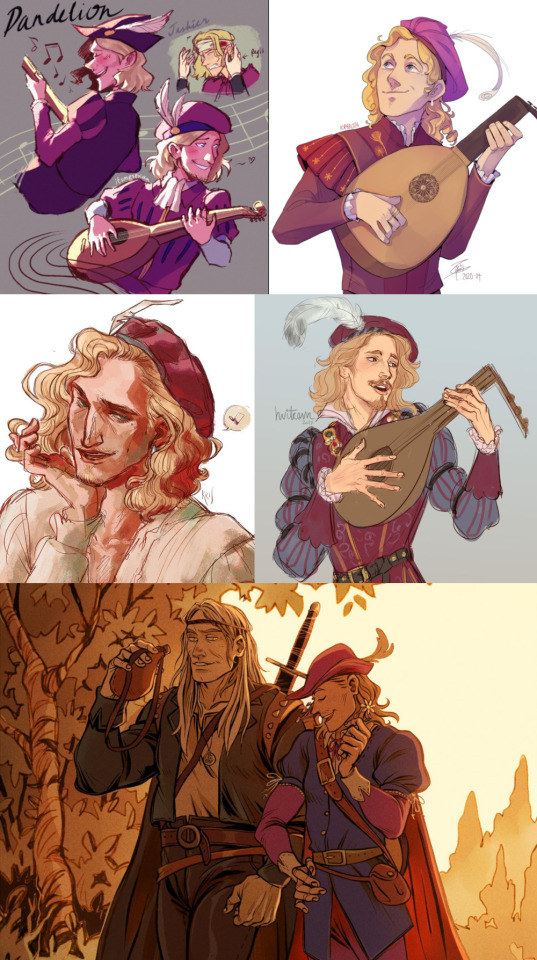
As for the games? Well, I cannot speak to how Dandelion came across in the original Polish, but I think it speaks worlds about the priorities of the English version that they didn’t even bother to cast someone with a halfway-decent singing voice as their master bard. There are isolated moments of dialogue that come close to sounding like book!Dandelion– mostly in Witcher 2, which comes closer to capturing the spirit of the books than either 1 or 3, or his attempts to convince his captor he's a disguised noble when you rescue him TW3 – but his voice actor is just painfully ill-suited to the role.
Geralt
Geralt fares much better than Dandelion, though he’s still a little hard to square with the Geralt of the books. Book!Geralt spends a lot more time sulking, just to begin with: he sulks because his job is complicated and gets him no respect, and because the world is unjust and unfair – and, most of all, he sulks because Yennefer has dumped him again. He also gets mocked for sulking, and usually deserves it. Book!Geralt is generally a lot more taciturn and a less prone to making smart comments just to have something to say – arguably because in book!Geralt's world, making smart comments often ends at the gallows, or at least with some corrupt official making your life much harder. Book!Geralt's world kind of sucks, and he's just got to put up with it.
As much as he often plays into the expectations of being an uneducated monster hunter, he's also got a more of an intellectual streak than you’d guess. He may prefer to stay out of politics (because damnit, his job is to save people from monsters, not people who are monsters), but he attended school at Nenneke's temple and has even taken classes at Oxenfurt academy, and there's a lot of thoughtful nuance to his opinions – his speech to Ciri about why he can't in good conscience take a stronger stance against the Scoiata'el contains a wealth of historical perspective, just for one example. Even his smart comments tend to be, well, somewhat smarter in the books.
Book!Geralt’s explicitly a lot younger than Yennefer – around 50 is the usual estimate, falling far short of the 100-ish the games suggest (the scandal of having a man fall for – gasp! – an older woman clearly didn’t bother Sapkowski one bit). You don’t see nearly as much "I'm getting too old for this" from book!Geralt, who's really not that old by witcher standards, and is apparently still hunting monsters long into his future. I'm also a little annoyed by the way they play off his hatred of portals like he's a grumpy old man who doesn't like mobile phones, when his distrust originally came from having seen the gruesome deaths that result when portals go wrong. This is not to say Book!Geralt lacks other ordinary human flaws, however – twice in the last two books of the main saga, he gets severely sidetracked after his ego gets the better of him (in the adulation he receives after being knighted, then after arriving in Toussaint), and it's quite some time before he properly gets back on track for that whole rescuing-Ciri thing again. He’s also pretty hopeless when it comes to romance and relationships – breaking things off gracefully is really not in his skillset.
So why does game!Geralt not bother me more? Well, he's the main player character of a game franchise, and one who has to carry the experience largely solo. Some adjustments for genre are pretty much inevitable in that position. He's certainly fared better than Meve, for example, who's been softened far more from her book characterisation for her PC role in Thronebreaker. Then there's the whole amnesia thing – it's easy to believe that sort of experience would change a man – and if he doesn't sulk so much as he used to, maybe he's grown up a bit. Geralt's also in many ways the straight-man of Sapkowski's Witcher universe – there largely as the reliable centre for other, louder personalities to play off. But I expect the real bottom line here is that I do still like game!Geralt enough to forgive him a lot of what he lacks.
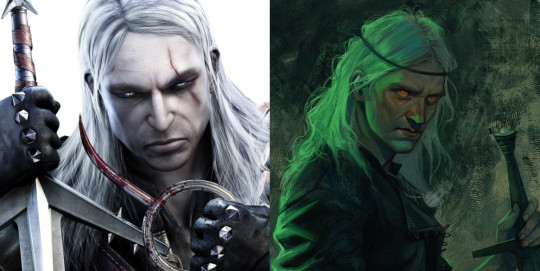
The books never do describe Geralt as being very attractive – something book-based fanart often tries to reflect. The point has been made before that the rather-alien-looking Geralt of the first game (left pic above) is probably a lot closer to his book-description. However, the main distinguishing factor you’ll see in book-based fanart is probably the ubiquitous headband, which genuinely is what book!Geralt wears to make his hair behave (the example on the right above comes from Diana Novich).
All that said, if Sapkowski really wants me to believe that nearly so many women are eager to jump into bed with him, I’m going to have to shallowly assume our witnesses are unreliable on this front, and Geralt is at least as attractive as Witcher 3′s take on him. Nothing else makes sense. *g*
Regis
Regis varies mostly in that book!Regis is a lot more smug, sometimes verging on obnoxious – and a lot keener to make fun of Geralt (who generally deserves it). But then, Regis is old and wise and superpowered enough to dance rings around most everyone else – can you blame him? By Blood and Wine, Regis' overconfidence has been recently smacked down hard after his near-death-experience at the hands of Vilgefortz, and that kind of thing could knock some chips off anyone's shoulder. Throw in the fact that with Dettlaff, we have a situation not even Regis could make light of, and the changes to game!Regis make a certain amount of sense.
I do feel it's a bit of a shame that the vocal direction didn't work just a little bit harder to capture some of Regis' smugger side, or emphasise that his long-winded philosophising on human behaviour is supposed to sound a bit pretentious. This is actually something I suspect they were going for a few times in the script, but which didn't come through in the dialogue quite the way it was meant to. Still, again, I'm sure I'm biased by the fact that I like game!Regis far too much to find much fault in what they've done with him. They've done a lovely job capturing his friendship with Geralt too.
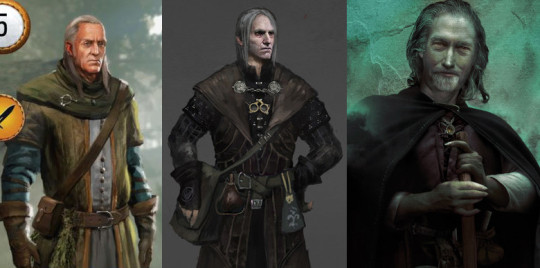
Looks-wise, there's a tendency in book-based art to portray Regis with long hair (even some pre-Blood-and-Wine Gwent art did so – see the two pics on the left above, from Gwent and early B&W concepts. The right-most pic is cover art from the books). I couldn't rightly tell you where long-haired-Regis comes from, though – perhaps it's described more explicitly in the original Polish, or perhaps it comes up in passing in some passage I've forgotten, though it may just as well just be a fannish meme.
The books do describe him as looking rather like a tax collector, slim, middle-aged, with an aquiline nose, prone to wearing black, and his hair as 'greying' or 'grey streaked', so presumably somewhat younger-looking than the game would have it. The hammer-horror-esque sideburns are likewise a game-verse addition, though I do like the look they went with – it's distinct from Geralt in a way that making him another long-grey-haired man wouldn't have been, and that's probably the point.
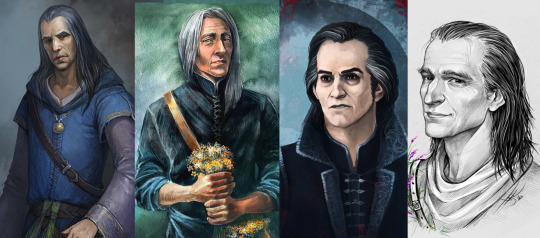
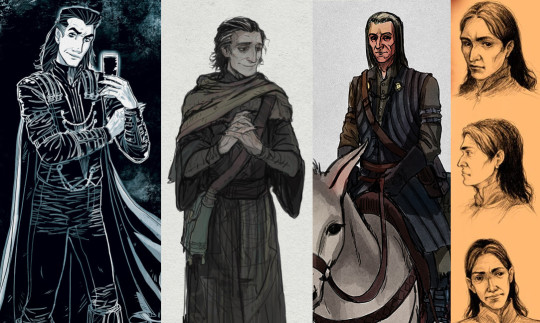
Being the hopeless Regis fan I am, I have quite the folder full of different fanart takes on book!Regis, so have a selection – art here is by gellihana-art, justanor, greysmartwolf, Nastyaskaya, NatalyLanier, beidak, natalliel, ellaine and afternoon63. For what it’s worth, I feel beidak’s (bottom pic, second from the left) comes the closest to what I’d have pictured personally, based on how he’s first described.
Ciri
I find it much harder to rationalise the changes to game!Ciri, who I didn't exactly dislike, but found stuck too close to the role of generic-macguffin-girl-who-just-wants-to-be-normal to be very interesting. Having read the books, not only do I much prefer book!Ciri, I'm not sure I can emphasize enough how much the game did NOT prepare me for utter gauntlet of whump and misery that girl survives in the last four titles. Book!Ciri is a character who works for me mostly because of the same flaws the game mostly strips her free of – TW3 makes some token noise about how you can't tell her what to do, but she’s an utter little royal brat when we first meet book!Ciri, and it’s so much of what brings her to life. She throws herself into her witcher training with the enthusiasm of a kid going completely native, but still revels in getting to be girly for a change when Triss first arrives at Kaer Morhen. She hates Yennefer at first, but soon bonds with her just as strongly as she ever did with Geralt, picking up some of Yennfer’s haughty mannerisms along the way. And then she gets thrown through a portal and lost in the distant wilderness, and the whole world comes down on her head.
The build up to the first time Ciri actually has to kill someone is intense... and things only get worse from there. Steadily. For another couple of novels at a stretch. Seriously, a major caveat that pretty much has to go into any rec for these books (and I will absolutely rec these books) is that Ciri's story gets heavy. So heavy one finds oneself using phrases like, "that time that one guy died of his wounds on top of her while semi-consensually feeling her up was honestly one of the less traumatic incidents in the period."
By the end of the novels, Ciri has nearly died of thirst, been beaten, tied up, dragged around the country as a prisoner, run with bandits and killed innocent people for the fun of it, done fantasy-cocaine and got a tattoo, fought off more than one attempted rape, been drugged, lain for multiple nights next to an impotent elf who completely fails to impregnate her, watched the bodies of her friends and girlfriend being mutilated in front of her, and did I mention where she got that scar? She has survived hell, and it is absolutely a testament to her own strength that she somehow comes through it and puts herself back together at the end. When Geralt finally arrives to rescue her, what matters most isn't that her ordeal is over, but that she finally knows she hasn’t been abandoned by everyone who’d ever loved her after all.
The Ciri of the books is fierce and wild and arrogant, but she's learned her morals from the best, and she holds onto them until she can't, then picks them back up again when she can, and above all she survives. For all that her story turns arguably too much of the last two books into a slog of misery, oh boy does it pay off at the end. And that's probably about as much as I can say about her Big Moment in the last book without spoiling too much, so suffice to say that by the end of the saga, Geralt has pretty much become a supporting character in Ciri's story, not the other way around. (Seriously, you’d be surprised how few chapters of the last two books he’s actually in.)
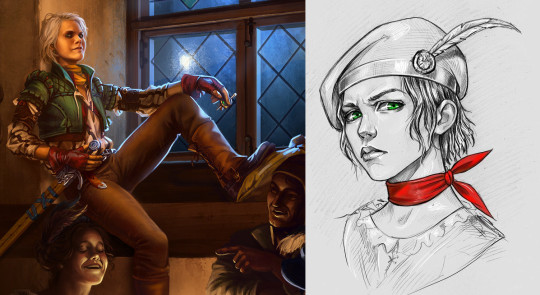
Finding art which captures the aspects of Ciri’s character and history which are missing from the game has turned out to be pretty hard, though the fanart above from her bandit phase takes a decent crack at it (credit to Loles Romero and NastyaSkaya). I do rather like that one shot of her on horseback beside her girlfriend too, which comes from Denis Gordeev’s illustrations for the novels (below).
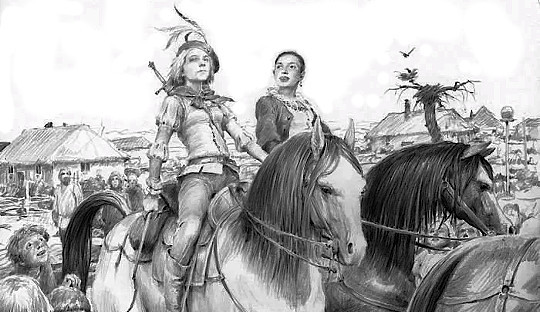
How much of this does TW3 get across with her portrayal in the game? Well, she's still pretty headstrong, I guess. And they let you give a 'sorry, I like girls' answer in one bit of dialogue, so they remembered her girlfriend existed. That's nice. But game!Ciri still has a kind of wide-eyed innocence that book!Ciri lost years ago, while book!Ciri is a little force of nature in ways the games hardly even hint at, and that's a really shameful loss.
You'd think, with a character so young, it ought to be easier to imagine she's simply grown up since we saw her last, but so much of what's changed about Ciri feels like a step back rather than forwards. I can shrug off Geralt and Regis' differences and still enjoy their game-verse-selves, but Ciri leaves me genuinely disappointed.
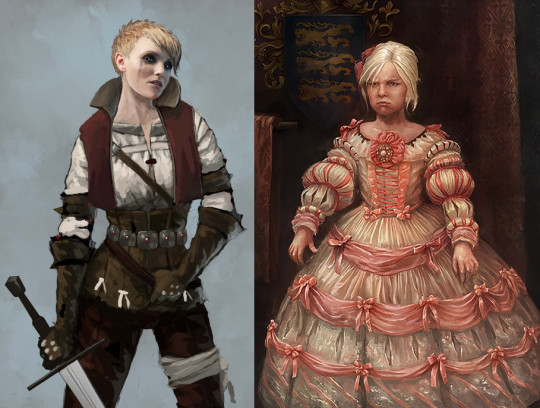
I’d say the official art that comes closest to capturing book!Ciri is that one portrait of her as a very grumpy young child (right above). Some of the early concept art (left above) feels a little more like it has her attitude, though she’s rather too yellow-blonde – not to mention too pretty. I think it also bears pointing out that Ciri isn’t really supposed to be the kind of beauty she is in the game – even before she gets what’s meant to be a seriously ugly and disfiguring scar. (Fanart below by justanor and bobolip)
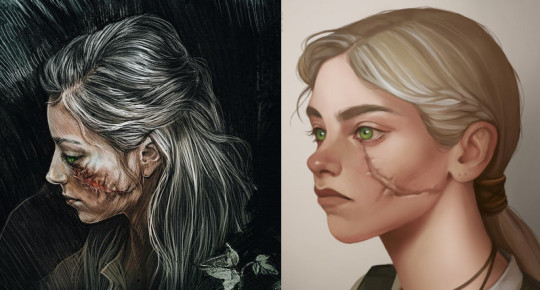
But of course, the male gamer fanbase can’t be expected to give a fuck about a girl they wouldn’t want to fuck, so game!Ciri must be generically gorgeous. Le sigh.
Triss
I suppose I should at least touch on Triss, too, though she's a very odd case. She's so out of character in the first Witcher game that I am wryly amused that the biggest thing they arguably do get right is that taking advantage of Geralt the moment he showed up with amnesia is... pretty well in-character for her (look, I gotta be honest here, I'm not much of a fan of Triss in any of her incarnations).
The second game does a much better job with her – she actually feels like book!Triss, she has some good dialogue, we're finally dealing with some of her conflicted loyalties to the Lodge and to Geralt – though by the third, her characterisation has been so softened into “the nice one” that none of that potentially meaty conflict is ever resolved, or even really mentioned. Perhaps there's more buried in the Triss-romance path, which I've never bothered with, but the writers seem to have just given up on dealing with anything that might make her look less than wholly sympathetic. Heck, we hardly even get a clear statement about why she and Geralt broke up between Witchers 2 and 3.
Even speaking as such a not-a-fan of Triss, I promise there is more they could've done with the character the books give us. There's her ongoing trauma in from the Battle of Sodden, where she was injured so badly she was memorialised as one the dead: the 14th of the hill. There's her furious impatience with the neutrality of both the witchers and the Lodge: Triss has fought and died for a cause, and is ready to do so again. The second game sort of gets into this, but by and large, the games really aren't up to tackling the moral complexity of having such a theoretically-sympathetic character as Triss, who was still broadly willing to go along with the Lodge's plans to pair Ciri off and get her pregnant as soon as possible – her own wishes be damned. No, instead, Triss has conveniently left the Lodge before the rest of them go spiraling into abject villainy in the second game, clearing all that messy grey stuff out of the conflict.
Of course, the really big unresolved plot point still hanging over book!Triss is how badly she needs to terms with the fact Geralt's just Not That Into Her, and never has been – but since the games want Triss to be a serious romantic option, that's definitely not getting the resolution it could've used.
Book!Triss also pointedly avoids any outfit with a plunging neckline because her chest is covered with the ugly scars she received in the Battle of Sodden, something the games did not have the guts to reproduce. In a more confusing note, the books do consistently describe her hair as 'chestnut', which we'd usually think of as meaning 'brown' – though it turns out the games actually may not have been wrong to make her a redhead, since in Poland 'chestnut hair' apparently mean dark red hair (google some pictures of actual chestnuts, and you'll see why). Still, the firy-red-haired Triss of TW3 who wears nothing but plunging necklines remains a bit of a stretch, however you slice it. Once again, TW2 gets her best (and I must say, gave her the nicest outfit) – though even here she's conspicuously unscarred in all her sex scenes.
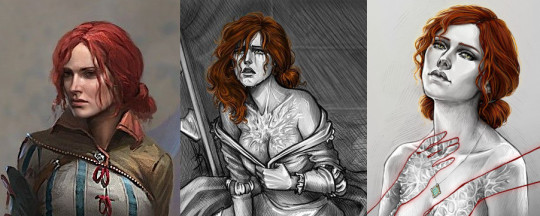
(Leftmost pic above is official Witcher 2 art, whereas Triss-with-scars fanart comes to us – once again – from nastyaskaya)
Shani
Shani sort of falls into a similar category as Triss as someone who isn't terribly well-served by any of her appearances, given that both exist in the first game largely to compete for Geralt's attentions. But I can't honestly say I find Shani’s portrayal in the Hearts of Stone expansion to be much better – the degree to which either version exists solely to fall all over Geralt is a bit painful, especially given that their relationship in the books is limited to a single, undramatic hook-up. Book!Shani really only appears in a couple of chapters: we meet her as a medical student friend of Dandelion's, who's been surreptitiously selling pilfered university supplies to fund her degree, then later see her again in the final book, where she proves herself as a battlefield medic during the climactic Battle of Brenna. She's pragmatic to a fault, and I really can't see her as the type who needs Geralt to point out to her that her patient is dead, for example, or who'd subject a guy with Geralt's problems to such an extended feelings-dump as you'll get out of her during the wedding.
Shani is a reasonably logical book-character to bring back, if only because she’s one of those who explicitly survives the ending, but for my money, "serious contender for Geralt's affections" is just not a role she works in.
Anna Henrietta
The duchess of Toussaint, Anna Henrietta, is another case who differs more from her book counterpart than you might think. In the books, the duchess is by far the least competent of the (pleasantly many and) various female leaders and rulers we meet – she comes across as rather young and naive, and every bit as absurd as everyone else in the ridiculous fairy-tale duchy she rules. She is, for example, most displeased to learn that Nilfgaard's war against the north is ongoing (something her courtiers have carefully avoided mentioning in her presence), because she'd long since sent the Emperor a stern note demanding he brought it to an end. She promptly has one of her ministers sent to the tower for misinforming her, and demands the others prepare an even sterner note for the emperor, which will surely do the job.
After Dandelion (inevitably) cheats on her, she has him repeatedly sent to the gallows, only to change her mind and send him a reprieve at the very last minute each time. Picture yourself a much younger and prettier version of the Queen of Hearts from Alice in Wonderland, and you've about got her general vibe.
Blood and Wine sort of waves at this part of her character when she first speaks about Dandelion, and again in suggesting there's a widespread feeling she lacks compassion, and once more as she proves utterly immovable on the subject of her sister. But the generally sensible and insightful woman you deal with for most of the main story is a far cry from her book-verse characterisation. That’s a bit of a shame, because I feel like there's a lot more they could have done to blend the two versions of her. Still, it’s hard to argue the duchess we get suits the story being told around her.
Other characters
Much as I love Yennefer, Dijkstra and Phillipa, I don't really have much more to say about them because I feel the games have done such a good job. The Yennefer of the books gets to show a lot more depth and complexity simply because she has more scenes and more space in which to do so, but when ‘there isn’t more of her’ is your biggest complaint, the game is officially doing pretty well. I could certainly gripe her about how “dresses in black and white” seems to have been taken as “dresses in black with maybe a trace of white trim”, or how Yennefer and Triss seem to be the only sorceresses in the world capable of wearing pants, when Phillipa (just for one) is in sensible men’s clothing the very first time we meet her, but that’s getting into serious nitpicking territory.
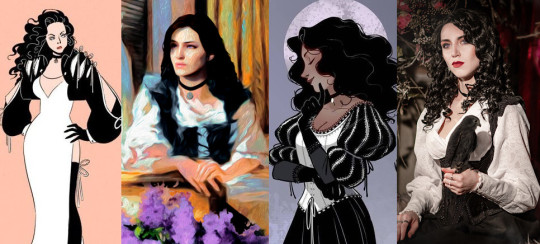
(Not that Yen can’t look amazing in outfits with more white – art by Emily Caroll, theclashofqueens, BarbaraRosiak, and cosplay by greatqueenlina)
Vesimir, Lambert and Eskel, Geralt's fellow witchers from the School of the Wolf, fall into a similar category for me – though we spend far less time with them in the books, everything we see of them in the games feels like a fairly logical extension of their book-roles. Vesimir is somewhat over-played as the old fogey, and his death is painfully cliched, but the impact on the characters and Kaer Morhen still hits home – and the games do some especially great work expanding Lambert into a much more complex character. To my mind, the only shame is that more of the book-original characters didn't get the same treatment.
Who have I missed? There's Avallac'h, of course, but I think I've got him pretty well covered by that last post. Zoltan, perhaps inevitably, has had his personality largely flattened into 'generic dwarf', with nothing better to do than hang around Geralt and Dandelion. You wouldn't know Book!Zoltan was apparently incapable of turning away women and children in need, for example – even human women and children with the chronic inability to say thankyou for his help. Or that he eventually admits to Geralt that the luggage he and his friends are carrying comes from a decidedly unsavoury source for such a supposedly charitable, upstanding guy. Yes, even Zoltan gets to be a morally complicated character in the books – who knew?
Speaking of dwarves, pleased as I am that Yarpen Zigren gets remembered in TW2, he's an odd one to talk about, since even in the books, he appears to have had a substantial personality transplant between his two main appearances. Yarpen’s a largely comedic figure in The Bounds of Reason short story, where he cheerfully admits to having considered letting his men knock down a particularly pompous aristocrat and piss all over him to teach him a lesson, but he’s evolved into a studious voice of reason against the scoiata'el by Blood of Elves. TW2 doesn't do a particularly good job of capturing either version, which I suspect probably bothered me more than most people – I liked the later book-incarnation of Yarpen immensely (and not even just because he's one of few ever to really call Triss out on just how much she needs to stop misreading Geralt's friendship as anything more than it is). His chapter in Blood of Elves packs a hell of a punch.
On the subject of accents
I do have to wonder if I'd have warmed up to characters like Triss, Shani and Dandelion (or even Letho) more if they'd only had halfway decent voice actors. It's not just that none are exactly leading the talent at the acting part of the job, it's that their American accents stick out in TW3 like a sore thumb.
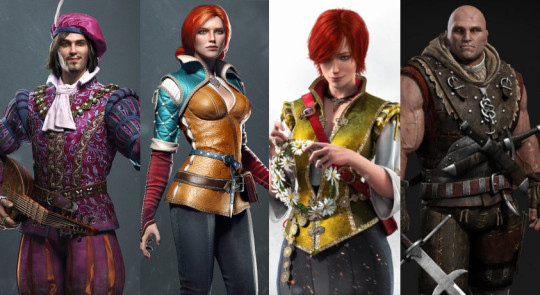
Geralt mostly gets away his own US accent by dint of being the very first character we meet, so we've gotten used to the way he talks long before we notice how he stands out – hell, maybe that's just how they talk down in Rivia (hilariously, book!Geralt eventually reveals he's not even from Rivia, but simply picked the place and taught himself the accent so he could feel a bit less like the abandoned foundling he is, which only gives us yet more excuse for why his accent might sound a bit weird). More importantly, Geralt is meant to stand out, to be the outsider wherever he goes, so having him sound like no-one else fits the character.
But neither Triss or Dandelion are "of Rivia", and by the time they show up we've had dozens of hours in a game where literally everyone else sounds British, or Scottish, or Irish, or vaguely-eastern-European in the case of the Nilfgaardians. So why do these weirdos sound like no-one else on the continent?
The short answer seems to be that every character with an American accent in TW3 is someone who had an American accent in at least one of the previous games, which were way looser with their casting and had enough incidental American accents around that they didn't stand out. Clearly, by TW3, consistency with prior games has been prioritised over consistency with literally anything else we’re hearing.
Gaetan is an exception to the rule as the only new character (at least that I caught) with an American accent – presumably because between Geralt, Eskel, Lambert, Berengar, and Letho (and cohorts), some sort of 'witchers have American accents' rule has been pretty well established (another random American-accented witcher shows up in Thronebreaker, just to underline the point). We're going to mostly ignore Jad Karadin here, since his British accent is presumably a recent affectation to go with his new identity, and so makes sense.
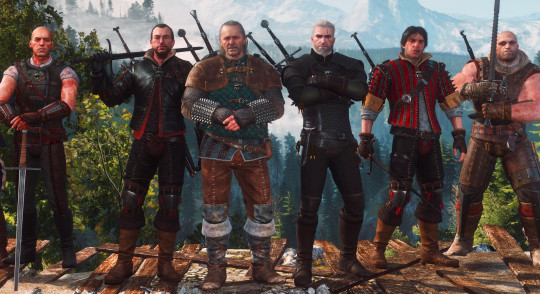
This still doesn't really work though, since Letho’s school is all the way down in Nilfgaard (land of the Eastern European accents), while the oldest witcher from Kaer Morhen (Vesimir) is the one guy with a British accent. He sounds nothing like any of his students, despite the fact he's logically the guy they ought to have learned their accents from. So the logic falls in a heap however you slice it, and I'm thrown right out of the game.
With TW3 as your intro to the series, it feels almost as if characters like Triss and Dandelion have been assigned American accents because they're just too important to be saddled with the same pedestrian British accents as everyone else, which did nothing to endear them to me. The only one I eventually warmed up to was Lambert, and then only because he's just such a bitter asshole that he eventually goes full circle and comes out the other side (somewhere around when you've heard his miserable backstory, then gotten drunk together and told him how much you love him, man). Gaetan similarly snuck in under the same clause – American accents clearly work better for me in this series when attached to characters you're supposed to find pretty insufferable on first impressions.
Some final notes
To conclude, it seems only fair to throw in a quick nod to some of the more memorable book-characters who don't appear in the games. Neither Mother Nenneke (Geralt's sort-of-surrogate mother) or Vissena (Geralt's biological mother) ever appear either, alas – Vissena doesn't even merit so much as a Gwent card, which seems quite the wasted opportunity.
Milva, Cahir and Angouleme – the three remaining companions of Geralt’s who died alongside Regis but who were not so easily resurrected – naturally don’t appear. But nor are even really mentioned in all the games, which seems rather less than they deserve after giving their lives to Geralt's cause.
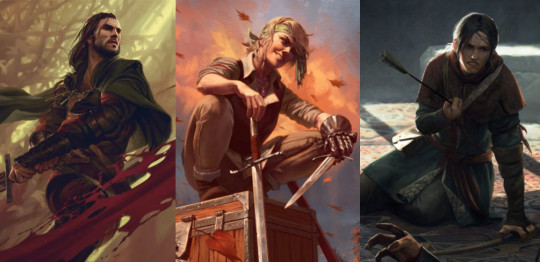
Cahir and Angouleme do at least have pretty badass Gwent cards to their names, though I am properly offended that Milva (who has the dubious honour of being my very favourite book character who doesn't ever appear in the games) is stuck with a card of her freaking death scene – which not only gets the scene wrong (believe me, there was no grimacing and gripping the arrow buried shallowly in her chest for poor Milva), but doesn't even bother to get her hair the right colour, for fuck’s sake. Basically, Milva was a stone cold badass and absolutely deserves better. #justice4milva
One can only guess how I'd have felt about some of these characters had I read the books before playing the games – I am obviously biased towards forgiving changes to characters whom I liked in their game incarnations, regardless of how they compare. Still, I think it does speak wonders that there still all these characters who suddenly made sense only after I'd met them in the books.
Even if only for Dandelion and Ciri, I can only dream of seeing a bit more of the book-original characterisations make it into the collective fannish consciousness. There's nothing wrong with getting into the canon purely based on the show or the games, but having read Sapkowski's novels, it's no longer any mystery how they spawned this massive franchise. That the saga wasn’t even fully available in English until well after Witcher 3 was released – a solid couple of decades late, and long after it had already been translated into Russian, French, German, Spanish and more – is a real shame. For once, it’s us in the anglophone world who’ve been missing out: these books deserve so much more than to be thought of as a footnote to the games or the show.
#Dandelion#Witcher novels#Jaskier#Ciri#Regis#Geralt of Rivia#meta#The Witcher#long post is even longer this time#I blame everyone who gave me such lovely feedback on that last post *g*
72 notes
·
View notes
Text
Tangled Salt Marathon - ‘Whatta Twist’ (second half of S2 recap)

It’s that time again. Where I cover the core overarching problems of the series in a season recap. Just take note that what I covered in the past recaps still applies the second half of season two, and what I talk about here can go towards past seasons as well; I’m just trying not to repeat myself.
And here is the past recaps if you’d like to catch up...
To Filler or Not to Filler
Hey, What Ever Happened to That Varitas, Guy?
What Is the Point?
Episodes covered in this recap are
Rapunzel: Day One
The Brothers Hook
Mirror, Mirror
You're Kidding Me
Rapunzeltopia
Lost and Found
Destinies Collide Part 1
Destinies Collide Part 2
Confused Ordering of Episodes

In the time since I have written their reviews, Rapunzel: Day One and The Brothers Hook have switched places once more on the Disney Plus app. Your guess is as good as mine as to what the true order of events is. If The Brothers Hook is indeed suppose to come before Rapunzel: Day One then someone somewhere didn’t communicate things clearly to the marketing team.
Meanwhile season one is still out of order on the Disney+ and I don't expect that to be fixed any time soon. It’s a minor complaint but it’s just another indicator of the poor management that this show suffers from.
Poor Foreshadowing

The second half of season two, and it’s season finale in particular, is meant to be the resolvement of a lot of plot points that have been in the works since the beginning; giving answers to many questions that the fans had been asking.
Supposedly anyways. It winds up not achieving that because the foreshadowing leading up to most of the twists was practically nonexistent. What we did get was too little, too late and far too bleeding obvious in order to make up for the poor planning thus far.
Too Much Exposition

A consequence of the this lack of foreshadowing and poor pacing mean that we’re given important information in a bunch of info dumps. There’s no less than five exposition speeches from three different characters in the last three episodes.
The audience has less means of absorbing needed information when it’s just told to us once by a character rather than shown. Moreover, what we’re told is sloppily presented, confusing, and contradictory. The explanations provided actively undermine the story rather than progressing things. Which is the opposite of what exposition is suppose to do.
Things Don't Add Up

The flip side of not having enough foreshadowing for certain plot points is that we get hints for things that’ll never be resolved or wind up being contradicted later on. What we get is a mess of an overarching plot where the villains’ plans don’t make sense and the heroes look like unthinking asshats.
Conclusion
This is why you plan things out before you start animating and why you don’t waste years of pre-production by changing the story in significant ways at the last minute. The story arc that Tangled started out with is not the one that we finish with come series end and it’s pretty plain to see that writing out certain characters and plot points wound up sabotaging the show.
Anyways that it for season two. Starting next week we’ll embark on the final leg of the journey with the first half of Rapunzel’s Return. In addition to this I’m going to be streaming season three episodes on the Tangled Discord as I go through them if you would like to join. No set times or dates, but I will acounce when the streams will be in the debate channel beforehand.
https://discord.gg/
54 notes
·
View notes
Text
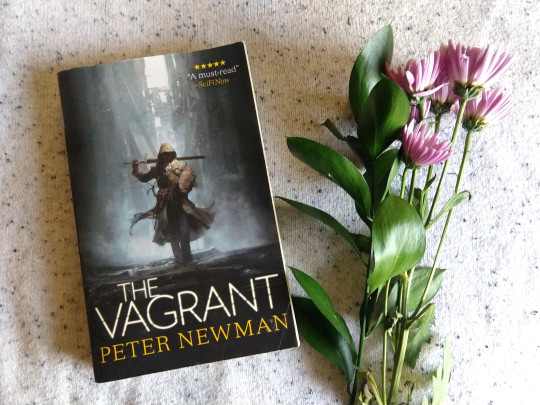
Books I Read in 2021
#48 - The Vagrant, by Peter Newman
Mount TBR: 46/100
Beat the Backlist Bingo: A non-human character
Rating: 2/5 stars
I did like enough about it to finish it, despite the concerns and complaints this review will list in detail; I don't care for it enough to keep going with the series.
I started this book almost two months ago, but in the middle of what eventually became obvious was a major reading slump. After 60 pages, I put the book on hold, reasoning that I was frustrated with reading in general and not with this specific book.
When I picked it back up, I started over, and this time, I annotated it to help myself pay more attention, and to pick at the edges of the mysteries that lie thick on the ground in this story. The "eight years ago" narrative line did eventually answer most of my questions--those it didn't were almost uniformly about world-building details I was struggling with.
So there's my first major complaint: this world is going for "cool" and "dark" without really having a cohesive style. Sometimes it's idyllic landscape, sometimes it's the Blasted Lands (which I will forever think of as a zone in World of Warcraft, but I guess the author hasn't played that.) The few cities had distinct but fairly generic personalities--one was a little Blade Runner, because there were neon signs everywhere, while another felt like a standard large fantasy town, and eventually the Shining City is certainly shiny, but also devoid of any originality.
The infernal aspects of the world-building--literally, the demons and how they worked--started out as an interesting concept, which I interpreted as them basically being incompatible with reality as we know it, and to combat that, they anchored themselves (in various and generally disgusting ways) to living flesh. Gross, creepy, excellent. But my early notes about what I pictured the Usurper and the Uncivil and the fallen Knights as actually looking like, or how I imagined they functioned, didn't end up jiving with information that came later. And yeah, readers can be wrong about things that authors set out clearly, but this felt more like I had developed a framework for the infernals that was more codified than what the author himself envisioned, because there were contradictions, and there were gaps, and whenever I encountered one I got frustrated.
Another frustration quickly sprouted from the style of the prose. What at first was a charming way to make sure I'm paying enough attention to connect some dots eventually became a slog. Yes, make me work for the connections about characters and plot. No, don't make me dig through every single line of a fight scene trying to figure out whose limbs are being cut off and who is buried under rubble and who died. There is a constant and deliberate lack of clarity to the narrative that I feel would serve the story better if it were saved for those big special occasions--who is the Vagrant, why can't he talk, how did he end up with the baby--than spreading it like a frosting over literally everything down to the smallest and most mundane details.
This extends to names, as many characters don't have them at all, or only get them late in the story, and even when they do, they are often still referred to by epithets. Harm doesn't need to constantly be "the green-eyed man," or I don't know, maybe he does, because half the time when he or the Vagrant look at something, the text doesn't say "The Vagrant looked at the sky," it says, "Amber eyes searched the clouds."
That's another complaint--the detachment. At the bottom of page 107, I scrawled a note to myself: "I've just hit on what I don't like about this narrative style--the descriptions sound like I'm reading a screenplay." The sentence which triggered this revelation reads: "Sweaty faces shine in shielded lamps." It's the first sentence after a scene break, and it frustrated me because I could see the effect of the description in my head--sweat glowing by lantern light in an otherwise dark space--but I didn't know who those faces belonged to! I didn't know who to picture because that sentence told me nothing about where the scene had jumped to! The following line tells me that men and women are in tunnels--okay, I'm in tunnels, but who are the men and women? The third sentence finally gives me a character name and I know I'm back with Tough Call's gang.
And this, too, is a constant problem. Not every chapter or scene break takes that long to establish who I'm reading about and where we are, but throughout the story, there's this repeated stepping back from the characters, a distancing, by referring to their actions in that deliberately obscure way. "Reluctantly, amber eyes open." "Breath labours in the dark." "A small foot twitches." I know that active verbs are great and conjugations of "to be" are easy to overuse, but it's possible to swing the pendulum too far in the other direction. Let my brain rest on some easy verbs and sentence constructions once in a while! Not everything has to be so vague and portentous!
Final stylistic complaint: I dislike present tense narratives in general, but lots of people like them, so whatever, authors are going to keep using present tense and sometimes I'm going to end up reading it. But I absolutely fail to understand the benefits of using it for the past story line. If the main bulk of the story is "now" and uses present tense, shouldn't the "eight years ago" use past tense? Because, you know, it's the past?
So after all of that, what did I even like about this? The baby. The goat--the tiny and rare scenes written from her viewpoint are generally hilarious. Harm ended up being okay, in shouldering the weight of one-sided conversations with the silent Vagrant. Though I question the wisdom of having a mute protagonist paired with a deliberately vague and detached narrative style (seems like an obvious recipe for the difficulty I had connecting to the story) I do think Harm brings out the Vagrant's desire to communicate as they get to know each other, and their deepening relationship as they bond over their struggles to save people, keep themselves and the baby safe, and still find a way to journey onward...okay, that was compelling enough to keep going even when I was frustrated by nearly everything else.
But the ending? No, sorry, this book failed to get me invested enough to care about why our protagonist achieved his apparent goal then decides to reject the dominant social order to do his own thing. I get it--it's super clear, even for this often-vague story, because the reason is exposited immediately after it happens. But I didn't care. And I don't have any need to find out what happens to our ragtag found family of weirdos afterward.
Hm, I hadn't considered that before. Found family, as a trope, pretty much relies on emotional investment in developed characters, whereas this story opted for (mostly) flat characters viewed from a safely detached distance. No wonder I couldn't get into it, these goals are fundamentally opposed.
#booklr#book review#book photography#the vagrant#peter newman#sorry booklr i didn't like it as much as the rest of you seem to#my reading challenges#mount tbr 2021#beat the backlist 2021
6 notes
·
View notes
Text

pairing: grimreaper!do kyungsoo x (reader)
genre/warning: fluff if you squint
word count: 3k+
description: sequel to ‘revenant’. your life with kyungsoo comes with an unnatural amount of challenges.
a/n: july installment...in december (don’t ask) of our ‘trying to write a kyungsoo story for every month that he is gone’ series. we know it’s the holiday season. we know this is spoopy. BUT we have finally reached year 2, which means sequals to a lot of our kyungsoo stories...or so i’m told. -em

Your father always said that life as the cemetery’s caretaker comes with more problems than benefits. Weird work schedule, no social life, constantly surrounded by the dead. You find little in your life to contradict him. Your current predicament only lends credence to his belief.
Waking up in a coffin without a body should startle you, but your father had also warned you this might happen. He had even had you spend afternoon’s in a coffin so you would understand where you were if or when it happened. Ghosts will always try to return to the world of the living. He had told you countless times. They have unfinished business; otherwise, they would pass on.
As caretaker, you have a connection to the dead. You can see them and communicate with them which comes in handy when you need them to stop destroying the hedges and defiling the mausoleums, but the connection also opens you to possession. Possessing the living is difficult for ghosts though, even with a connection. However, last night you had broken one of the cardinal rules of being a caretaker. You had gone to bed drunk.
You had come home after a long night of work to an email from the City Council with a list of complaints about your work. The flower beds needed weeding on the west end. Ivy had overgrown several prominent crypts in the east end. The walking paths by the north gate had unsightly cracks. The list went on and on. The City Council likes to forget that you are one person who can only work at night. All the other caretakers they have hired quit within the first week, and the Council wishes to maintain a pristine image of the cemetery for tourists which means that all work done must be done out of sight of them.
Halfway through the list you had popped a beer. You finished the first one before the clock struck eight. By noon, you had finished the remaining beers in your fridge and felt much better. You could laugh about the two malevolent spirits from the night before and the tornados of fury they had unleashed on five plots a piece. You reread through the Council’s demands, adding colorful commentary about what they could do with their list.
A competent caretaker would have stayed awake until they sobered, but a competent caretaker would have also stopped at two. You passed out on your couch which is why you were currently waking up in a coffin.
You sigh again. Your father will be so disappointed when he finds out. He was the previous caretaker and had gone his entire career without ever being possessed. He taught you because it was a necessary lesson of a caretaker, but he had patted your head and told you he believed you would never need the lesson. If you could bang your head against the coffin’s lid, you would.
As lying in the coffin will do nothing to aid your situation, you will yourself to rise through fake silk and mahogany and six feet of dirt into a new night. The cemetery awakens around you, familiar ghosts rising from their graves. They float with ease down paths as they go about their business. You struggle to move yourself down the path to the south gate which is blessedly close to the grave of your body snatcher.
“Can it truly be? A ghost has stolen our dear caretakers body.” The gleeful exclamation breaks your concentration and you stutter to a stop. Of all the ghosts to see you in this state, it had to be her.
You ignore her as you resume your journey. She floats circles around you, continuing to grin but maintaining silence. On her third trip around, you stop and raise your hand, staring at it. You wonder. She stops in front of you and chuckles. Hand extended, you place it on her cheek. It stops, unable to pass through. The place where hand meets cheek feels like the chill mist which rises from a waterfall but solid. Her brow furrows as you pull your hand back. Realization brightens her eyes, but too late. Your hand collides with her face and sends her flying feet from you.
She whines, a high pitched wail which has surely sent a chill rushing up some passerby's spine.
“For what reason, do I deserve such treatment?”
“I have a long list, but I’m certain you know what most of them are.”
Her nose scrunches up and her lips purse, but she keeps her peace. With a huff, she floats off.
You allow yourself a moment of pleasure. Being possessed is unacceptable for a caretaker, but it has a benefit. You have wanted to slap her for years.
After much struggle, you reach your house which rests near the cemetery. You glide through the door and head for the study. In the Caretaker's handbook, there is a section on what to do if possessed. You read it when you were young, but years have stolen much of the information from your memory.
The book sits on the middle shelf in a middle bookcase in the study, eye level with you. The peeling spine with its faded black script taunts you. The dead affecting the dead is an easy task, but the dead affecting the living world takes years of practice and a deal of determination. Your hand swipes through the book over and over again as your frustration mounts. You shriek. A gust of wind rushes through the room rustling the pages on your desk, but the book remains locked in its spot.
Aside from you, no one in the city can see ghosts. There’s a girl down the street who might be able to hear them, but once her ears open, she can never close them. You will leave her to her oblivion. No one should have to deal with the constant pestering of ghosts. You make another swipe at the book with no hope and no alternative.
“Do you require assistance?”
Another benefit to add about being possessed: no blushing. Also no shivering. No indication of embarrassment or attraction.
Spinning like a ballerina in a music box, you face Kyungsoo, your cemetery‘s designated reaper and your first crush. The answer is ‘yes’, but you’d rather him go away and pretend he never saw you in this state. “Do you know how to reverse a possession?”
He blinks, the gesture odd on his solemn face. After a moment, he shakes his head. “I have never had to deal with a possession since becoming a reaper.”
You nod. Of course, you would be his first possession. “In that case, could you grab that book?” You point at the guide. When he does, you direct him to set it on your desk and consult the index for the section on possession. Page 74. He flips the pages and settles it before you.
“It seems simple enough.” You muse. “Find my body. Remove the spirit. Re-enter my body. You can remove a spirit, right?” A glance at Kyungsoo negates your simple comment. “What?”
“I can remove the spirit with my scythe.” The large metal hook shimmers into existence on his back when he starts the word and disappears again when he finishes. “However, it would be a permanent removal. A spirit guilty of possession does warrant such punishment.” His voice is soft, and you can sense the ‘but’ he leaves unspoken.
Kyungsoo, like you, has a soft spot for wayward ghosts. Rather than send every malevolent spirit to hell, he attempts to coax them back to themselves.
“Then I’ll have to convince it to leave. Which shouldn’t be too hard if I can figure out what it’s unfinished business is.” Kyungsoo’s brows furrow. “It’s easier than you think.” You shrug as you glide past him, your movement less stilted now but still difficult.
“As caretaker,” you continue, pausing in front of another bookshelf. “Can you grab the last book on the third shelf?” He does and sets it by the Guide. “It is my responsibility to catalogue each plot and document its resident. Open it at the bookmark. The grave I woke in is fairly recent, probably in the last year. Flip back a few pages. Stop!” Your finger hovers over the page as you scroll down the list of names. “This one.” Lee, May. Buried June fifth. About six months ago then. Beside her name is the superscript III.
Gliding over to yet another shelf, you scan for the corresponding notebook. “Can you…” The request peters out as you glance back at Kyungsoo. His dark eyes shift between the book on the desk, you, and the bookshelves around you, and you can imagine the cogs in his brain turning as he puzzles the pieces together.
“Cataloguing their name, date of death, and resting spot is the responsibility of a caretaker, but why notate about their lives?” He asks.
“My grandmother taught me too.” You pause as grief stirs. Even as a ghost, the emotion rises. She moved on. No lingering regrets kept her tied to this place. Kyungsoo, himself, saw her off.
“She said a proper caretaker knows her charges; otherwise, she can’t do her job properly. Dad didn’t see the purpose in it.” Your gaze shifts to a shelf with one growing volume. In what little free time you have, you have started to go through the burials in his time and record the details of the dead.
“Your grandmother was a great caretaker.” Warmth fills his voice, or perhaps jealousy is fueling your imagination. Kyungsoo has been the cemetery’s reaper since before your grandmother’s time. She was a great caretaker. She loved her work, and, unlike you, had never shirked her responsibility.
“Yes.” You say because the alternative is an awkward silence. “Can you grab this one for me?” Without a glance back, you indicate the notebook with the corresponding III. His arm reaches past you, his body against your back. You wish you could feel his presence.
He sets the notebook on the table and opens it to the date of her death. You read through the entry, ignoring him and focusing on the task at hand. May Lee left behind a husband and a son. The son is twenty-four. The quick sketch of his face at the bottom of the page resurfaces the memories from that day.
Even though the funerals occur during the day when you sleep, you drag yourself from your bed to attend. From a distance, you record the key points of the event, mainly who comes and how the new ghost reacts to their farewell. Mrs. Lee had stood beside her weeping son throughout the entire service. Her face had been a mess as she had reached for him. She had grown more and more distraught each time her arms passed through him instead of wrapping around him.
“Her son. Whatever her reason for possessing my body is, it has to do with her son.” You snap your fingers and miss the satisfying sound of the click. “Can you turn the page? His address should be on the next page?” Kyungsoo does. Closing your eyes, you picture the words and repeat them to yourself.
“Would you like me to bring the book with us?”
“Us?” Your eyes snap open, and you stare at him.
He nods. “I will accompany you. Unless you no longer wish my assistance.”
You could write a check list of your body’s reactions to this moment and are again grateful that your spirit lacks the ability to create any of them. “I mean if you’re not busy.” With a smile, he closes the book and tucks it under his arm before waving you onward.
Kyungsoo matches your snail’s pace. With each block you pass, your irritation rises, and you begin to realize why most ghosts only haunt the cemetery. Even if you had better control, it would still take forever to get anywhere around town and beyond. “Can ghosts learn how to ride in cars?” You ask as another one whizzes down the road.
“Yes, but it takes great concentration to maintain a solid enough form and often results in sightings which lead to Grim Intervention.” You nod in understanding and keep trudging forward.
A chill like the first breath of autumn air settles on your hand, and a glance reveals Kyungsoo’s wrapped around it. His skin has no texture, no solidity, but it holds yours. He pulls you along beside him.
“I suppose I should have known that a reaper could affect the dead world as well as the living.”
“If my assistance insults–” He begins to pull away, but you tighten your grip, an odd sensation like trying to grasp the wind.
“It doesn’t. I appreciate it, especially if it means I’ll get to my body faster.” Though you are enjoying the time with him. “We both have important duties waiting for us.” The cemetery comes first.
The son’s house sits at the edge of town. A monstrous structure of red bricks and white columns and far too many balconies. Despite the late hour, several cars still circle the fountain at the driveways center. Lights shine through the windows, and you catch the shadows of figures as they pass in front of them.
Kyungsoo pulls you through the front gate and up the drive to the glittering building. You pass by groups of people as you traverse the mansion’s halls, searching for your face amongst the unfamiliar ones. Deciding that May must be with her son whose presence is also lacking from the assembled guests, Kyungsoo leads you up the stairs, a feat impossible without him. Your ghostly form responds well to front and back and left and right, but up and down prove difficult.
The second floor breathes an air of relief, the crowds unwelcome in this private space. It begs the question though why the son would be alone up here with so many guests below. You pop your heads into the rooms as you pass. They are stale with emptiness. If you were human, you would shiver, but as you are, you sigh and walk past.
Turning a corner, a pair of doors greets you, light lining its bottoms and sides. In front of the doors, your body stands. A hand hovers over the knob.
“He won’t recognize you.” You call, startling the figure. “You’ll just be some random, crazy girl.” May stares back at you, your face paling whether because of you or the reaper is left to the imagination. “We’re not here to harm you. I just want my body back.”
“My son-” Your voice breaks, the sound stiffens your spine. You refuse to cry in front of others.
“I know you miss him. It’s not easy to let someone go, but this is dangerous. If I was here with any other reaper-”
“I promised him.” She cuts you off with another sob, covering your face with your hand. The sight roils your stomach.
The cool breeze of Kyungsoo’s touch settles on your shoulder. They ease as you meet his eyes and acknowledge the unspoken words. You glide back as he walks forward, stopping a few feet from her.
“May, please come with us. You hurt your chances standing outside his room, engaging in a one-sided conversation.” His low voice eases hand from mouth and calms shaking shoulders. She nods and places your hand in his proffered one.
One of the empty rooms offers a safe place for conversation. May begins, “I’m sorry. I know I shouldn’t have taken your body, but I promised my son.” The words quaver on a sob, and you fold your ghostly arms to keep you from doing something regrettable. You need to coax her out and random displays of aggression won’t help.
“He became engaged when I was admitted to the hospital.” She continues once she has calmed again. “He told me I had to get better, so I could come to the wedding. I promised him I would and that I would tie his tie. He’s always been awful at it.” A sniffle and a smile punctuate the statement. “The wedding is tomorrow.” Tears pool again. Sympathy wars with annoyance, so you fix your attention on Kyungsoo. The eerie serenity of a reaper holds his features in place as he awaits the story’s conclusion. You force your features to mirror his. “I want to keep my promise. I had no intention of stealing your body when I came. I only wanted to asked for your help, but-”
“You saw an opportunity and took it.” You shake your head. Any ghost would have. A caretaker courts danger during every moment of their job. A good caretaker prepares for it. Both your father and grandmother drilled this fact into your head, and you had failed them. Despite your annoyance at her for such a disgusting display of emotions in front of Kyungsoo, you understand. Your grandmother made many promises and passed without warning. She would have never attempted a return, but you wish she had.
“No matter your reasons, your actions are a damnable offense.” So much for coaxing her out.
You suppress the accompanying moan, the sound unseemly on the eve of a wedding. Your attempts to gain Kyungsoo’s attention and redirect the conversation fail. His focus remains solely on May. “The longer you remain in this body the more you will draw the notice of other reapers.”
A shudder shakes your body, and again you try for his attention in vain. “For your sake, you must leave. We will find a way for you to keep your promise to your son.” He holds his hand out to her while you gape at the both of them. Why even come along if he was going to go with the brutally honest approach.
May’s hand rises from within your body. The spectral fingers grasp Kyungsoo’s, and he pulls the rest of her out. Your body falls limp to the floor, a creepy shell with lifeless eyes. You blink, and the eyes blink back at you.
Closing your eyes, you mimic the inhale of breath. The Guide had said in order to return you must remember the feel of your body. The way your chest expands with each gulp of air, the weight of skin upon bones, and the steady beat of your heart in your veins. Opening your eyes, you look up at May and Kyungsoo from the floor. As you sit up, you take stock of your body, wiggling fingers and toes and stretching muscles.
“I didn’t expect it to feel so weird.” You muse, pushing yourself off the floor. Your legs wobble beneath you, and Kyungsoo grabs your arm to steady you. His solid hands are cool still, but the thrill of an autumn breeze is missing.
“It will feel normal soon enough.” He promises.
Whether he’s right, only time will tell. In the meantime, you have a promise to keep. “How are we going to help her tie her son's tie? I have no idea how to do it, and I doubt he would want a reaper doing it.” You continue to lean on Kyungsoo as you glance between him and May.
“May will walk you through it, and you will help him to see her.” His confidence is nearly strong enough to make you confident, but not quite.
“She can make me visible to my son?”
Your “no” contrasts with his “yes”, and you stare at each other in a silent battle. Your grandmother and father trained you in all the abilities of a Caretaker. Neither of them had mentioned the ability to make ghosts visible to the living. You communicate this through your glare while Kyungsoo returns it with quiet confidence. “How?” You finally mutter, pulling your arm from him to fold it across your chest.
“Through your will. As a caretaker, you are a bridge between the living and the dead.”
“And as a grim reaper aren’t you the same?”
He shakes his head. “I am a gateway for the dead and am able to affect the world of the living because the dead do.”
“Please.” Your protest dies on your lips as May rushes towards you, her sad smile full of hope. She reaches for your hand, her fingers passing through it but you feel them comb through your palm. You shiver. “Will you try? I can teach you how to do his tie.”
Holding her gaze bolsters the shred of confidence Kyungsoo instilled. “How do I will it?”
“You already are.”
As you watch, color returns to May, her body solidifying before you. The light from the chandelier above still casts no shadow, but the wall behind her is lost to her form. You grasp her hand. The skin is soft and will give under the slightest pressure, but you can feel it.
“Creepy.” You whisper. An odd word for a caretaker, but today has been an odd day.
The rest goes easy, or as easy as telling someone that their dead mother is going to keep her promise through you and then making their dead mother appear before them can be. The fact that her son knows about you from rumors around town does help though. After the initial shock, everything does go easy. The next day May’s son allows you to tie his tie while she stands visible beside you.
Her promise full-filled, May faces Kyungsoo ready to pass into the beyond. But Kyungsoo allows her another mercy. The three of you stand at the back of the wedding hall to watch the union, and when her son glances back after his first kiss with his wife, you will her to appear. She waves, her face beaming with joy. You smile, and when you glance at Kyungsoo, you find a smile on his lips too.
23 notes
·
View notes
Note
My attitude toward the DC comics is that the first one, being designed to catch up non-RWBY fans to V1-3 plot stuff, is almost completely noncanon. The rest I generally consider canon, aside from Artstyle Choices making situations that conflict with what's already established. It helps that most of the comics take place during the V3-4 timeskip, and don't majorly contradict the show. And also that there's a LOT of shipping fuel.
see, i feel like i have gotten almost completely opposite vibes from the comics (which probably makes sense because everything i’ve learned about them has been against my will lol)
when they first announced the comic series and said it would take place during the timeskip between v3 and 4, i was pretty darn excited. if there’s one small complaint i have about the show, it’s that it skipped most of the immediate reactions to the fall of beacon. like, how did jnr react to pyrrha’s death? did the boat blake was on leave from vale, or did she have to travel across sanus to the east coast first? how did cinder, after nearly dying, make it out of beacon?
there’s so much stuff to explore during that time period, but instead the comics seemed to take place everywhere but that time. flashbacks to childhood and beacon days? you got it! taking place during a time that makes it feel like pseudo-v4, to the point it’s straight up rewriting v4 events? it sure has that! they even touched upon v5 too!!
based on my knowledge on the comics (which is obviously lacking), if most of it falls apart under scrutiny, no matter how many times crwby or anyone else claims they’re 100% canon, it’s impossible for me to consider them so. if the comic had actually been basically a volume 3.5 like it was originally announced as, i would have been fine ignoring some inconsistencies with the show, as it would have handled things that the show hasn’t. but when it so blatantly ignores what’s already in the show just to do it’s own thing? ...nah.
if the show makes things from the comics canon, then i’ll take them one by one and how they’re presented in the show, but for now, i’ll happily ignore the comics completely.
#rwby#rwby comics#okay this is a last thing i'll say about this topic#i don't really have more to add and before this i had already managed to forget the comics existed in the first place#and i want to get back to that lol#anon#ask.strqyr
18 notes
·
View notes
Text
My thoughts on the Snyder Cut
Overall, Snyder Cut is the more competently made Justice League movie. I watched the theatrical release with my girlfriend - who has never seen MoS or BvS or JL before - before watching the Snyder Cut with her a few days later, so it’s still fairly fresh in my mind.
The Snyder cut is better organized and (despite being 4 hours long) better paced. I really gave ZERO shits about the mother boxes the way they were presented in the theatrical release, but I was engaged with the plot from the start in the Snyder Cut. Scenes were reorganized in a way that were more logical. Fight sequences were paced MUCH better, and kept me interested in what was happening on the screen - my girlfriend and I SKIPPED the last fight sequence in the theatrical release when we watched it because we were BORED; we didn’t get that bored at any point during the Snyder Cut.
Most of the scenes I liked from the theatrical release are ripped wholesale from this version of the movie, with maybe an exception or two.
EVERYTHING with Cyborg is better in this movie. Like. EVERYTHING.
The lighting? Is SO MUCH better. The theatrical cut is SO UGLY compared to this movie. My girlfriend couldn’t look at the bat suit in the theatrical release for a second without complaining it looked terrible, and that was a nonissue in the snyder cut, the bat suit looked amazing. Diana’s low necklines were still there, but no longer shot in a way that was distracting. And dear god, the Steppenwolf redesign looks so much better, god.
Speaking of Steppenwolf, our villain now has a character motivation! He’s in some way sympathetic and understandable! Wow! Now I fucking understand why our villain is doing what they’re doing, and it plays into the theme!
And that’s where the praise has to stop, because now I gotta get into the complaints. Under the cut, so now one has to listen to my bitching if they don’t want to. (Also, I get into like, spoilers, so be warned)
Okay, this movie has a theme, and the theme is family, and it is SO POORLY EXECUTED. Snyder doesn’t do “theme” particularly well - the family angle is kind of an after thought. It’s there, for sure, Steppenwolf wants to go home and be part of his family again, and family is a big part of Cyborg’s arc, and Barry’s stuff with his dad is pretty strong, but this movie isn’t Cyborg and the Flash vs. Steppenwolf - it’s THE JUSTICE LEAGUE vs. Steppenwolf. Each character has a connection to their family that is TOUCHED on, but it’s not given the weight it needs. Diana receives a message from her mother, but Diana doesn’t go visit her at any point or send a message back or anything. Aquaman talks about his mother and father kind of expositionally, designed to set up for the Aquaman movie which now contradicts the already existing Aquaman movie, but we never see his family nor get a strong sense of connection. Clark’s reunion with his mother is extremely brief and unimpactful. And Bruce, who has so much opportunity to delve deep into family connections, especially as the only member of the League who’s ever been a father, confirmed by the nightmare sequence, is given nothing to work with on the family front.
That’s another thing, Snyder does plot driven movies, he doesn’t do CHARACTER very well. He’d rather exposition for 20 minutes than delve into the emotions of his characters. We’re given an idea that maybe Diana’s worried about her mom, and Bruce is probably still grieving his dead child, but none of that is dealt with. Like, Superman is a McGuffin, he has some emotional weight when he goes to get the black and white suit and you get the overlapping dialog of Jor-El and Jonathan, but he gets over being DEAD so fast, and his reunions with his family are like... limp noodles. I think the worst offender is the death of Cyborg’s father, which I found extremely clunky, and Victor has feelings about it for, like, a scene, kind of, and it just gets pushed aside. His own teammates are barely empathetic that he just lost a parent. I’ve already heard people praise this scene as “more interesting and emotional”, but I found it EXTREAMLY clunky and awkwardly handled.
Speaking of the exposition, it goes SO LONG. Like, SO LONG. We don’t need this much info dumping, it drags the movie. Cut Diana’s explanation of the mother boxes down to, like, three minutes, five max. Maybe do it like the Story of Ares from the Wonder Woman movie. Keep the first scene of Steppenwolf and Desaad establishing Steppenwolf’s character motivation and then like.... cut.... everything.... else. Between Steppenwolf and Desaad. It mostly exists to set up the fuckin’ Anti-Life equation sequel bait, which we don’t need explained in detail in THIS movie; just have Darkseid mention it at the end as a reason to return to Earth at the end like they already do and cut out all the stuff setting it up, let it be a mystery. And then Cyborg’s info dump on his powers wasn’t necessary, though I liked the way it led into a warm fuzzy moment of him helping that family, and he kinda smiles like, yeah, he likes helping people, he’s on his way to accepting himself and stuff. But then the extra info dump about how his dad’s lab came into possession of the cube like “WELL, IN WORLD WAR 2 - “ like aaaaah, no one cares, cut it.
Uh... I wish I saw less of Darkseid. I feel like the movie ruined its own suspense by showing off Darkseid’s full design within the first hour. I would have prefered a, you know, more Fire Lord Ozai approach. Don’t show him until the end - or AT ALL, if they can manage it, leave that for a future movie, given this was made with the expectations of more movies. Darkseid’s design was also really disappointing, like Steppenwolf looked so GOOD, he was big and menacing with the armor on, but next to him Darkseid looked... small. I wanted him to be bigger, broader, more menacing.
Uh... Martian Manhunter. Cool reveal, very shocking, I was hyped, uh, but did not make a load of sense. Very weird moment. And then when you see him again, and Bruce is like “this may as well happen” lol, omg, how checked out is Bruce?
Lois Lane remains... a limp wet paper bag, and I would have preferred her replaced wholesale with Martha. Love interests being the Thing To Calm The Rampaging Hulk Kryptonian only works if, like, the audience is on board. And I never thought Snyder’s Clark/Lois romance was very strong, because of Snyder’s whole plot-over-character thing, and also I thought this depiction of Lois kinda sucked... But with Martha, you can at least fall back on the cultural concept of a boy’s love for his mother to stand in for weaker character set up, and it would play into that theme of family a lot better.
I don’t know... how to unpack why... the nightmare future injustice dream sequence.... made me physically angry. But man did I not like that. I feel like I manifested a confirmed Robin death... in the worst way possible. Because boy. I HATED THAT.
Oh! Uh, and I didn’t like Barry’s new introduction. I thought it was weaker than seeing him meet with his dad in jail, and it was kind of... off mood. It was really SILLY, and nothing else in the movie was really that tonally silly. Barry was overall treated with more respect in this movie, but it still felt like the movie was somewhat disinterested in Flash’s whole... brand. Barry stuck out a bit as the one character who was overall not really particularly angsty. I will say, I miss the scene from Whedon’s theatrical release of Barry overcoming his fear by taking Bruce’s advice to just save “one” person; that was a good scene and played well into Barry’s youth and inexperience and into Bruce’s history as a mentor and a father. That said, FUCK did Whedon nerf the shit out of Barry’s powers. This boy can TIME TRAVEL.
9 notes
·
View notes